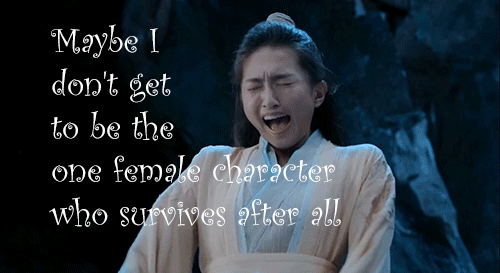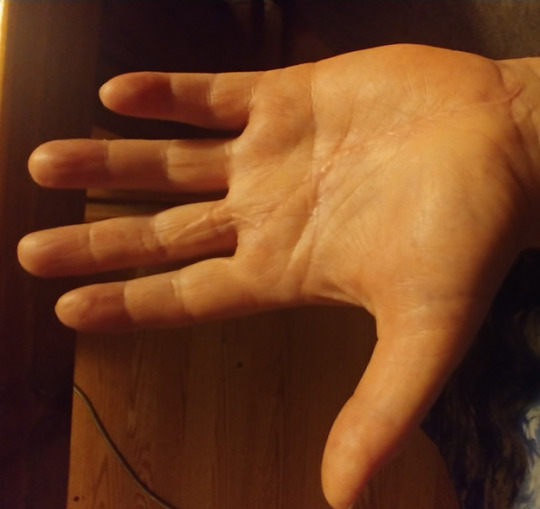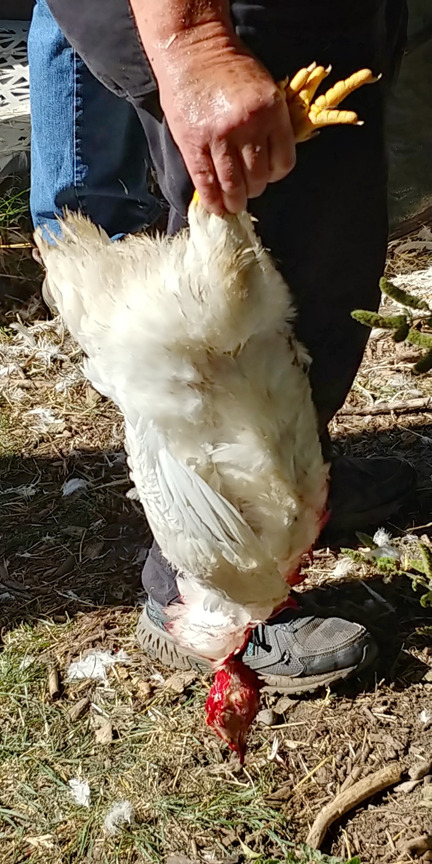#(who is introverted and serious and a bit cranky)
Explore tagged Tumblr posts
Text
It's a good sign I'm recovering from my creative slump that I was able to brainstorm a story that makes me laugh.
#all it took was one shot from the disney batb#beast made a face that was very expressive of the man underneath#and a retelling started forming as a cheerful version of the beast started chattering at me#lovely man#doesn't know how to shut up#it's a major issue between himself and his beauty#(who is introverted and serious and a bit cranky)#he insists on telling the story to his children#despite my doubts that he'll be an objective or honest narrator to these young ears#and even then he refuses to tell me most of the story#all i've got is his first dinner with beauty (did not go well)#and i'm like 'how did she go from that to wanting to marry you?'#and he's like 'i'm just irresistibly charming'#and i'm like 'clearly not because you just told me how she resisted you. why did she change her mind?'#and he's like 'idk. lack of options? i'm just thrilled it happened i'm not self-aware enough to figure out why'#and i'm all 'can you at least tell me what you did? it can't just be that you had long boring days in the palace#'and then she suddenly fell in love'#and he's like 'but what if it did happen that way though?'#and i'm like 'make something up! i don't want people to fall asleep reading this'#and he's like 'sorry can't help'#so i try to talk to beauty but she doesn't want to talk to strangers so i'm stuck#but what i do have is a very hopeful sign of returning creative health#for some reason even though i have a jillion batb ideas#the funny ones are the only ones i get interested in enough to actually write#we'll see if this becomes one of them#adventures in writing
16 notes
·
View notes
Text
Restless Rewatch: The Untamed Episode 13, second part
(Masterpost) (Other Canary Distractions)
Warning: Spoilers for All 50 Episodes!

This Fucking Turtle
The rock that Wei Wuxian and Wen Chao are standing on starts to move, because of course it does. It’s a tortoise shell, sort of. There are some problems with this ostensible tortoise.
First, Murder Turtle a tortoise is technically a turtle don't @ me doesn't look anything like a turtle. I try really hard not to project my western mythologies onto Chinese works, but god dang this thing looks like the Loch Ness monster.

Second, its shell wobbles a bit, but there's no indication that the creature can move around the cave until much later. During an extended fight with several tasty cultivators, it stays put and just moves its head around.
The immobility problem aside, it's not a terrible monster. After the hell dog, I'm relieved to have a normal CGI beastie where some things are done really pretty well. Its eyes and skin are particularly good.

What's not good are the teeth. When Murder Turtle closes its mouth, its long pointy upper teeth have nowhere to go, so they pierce its lower jaw and just sink in there. No wonder it's pissed off.
Its relationship with its shell is...well, let's save that for the next episode.
Irons in the Fire
Meanwhile, Wang Lingjiao (Wen Chao's girlfriend) decides she's in the mood for barbequed MianMian, so she grabs a hot iron to burn her face.

Wei Wuxian to the rescue! He shoots three arrows at once and hits all three of his targets, in a move that he'll repeat with even more arrows at a later date.

Wang Lingjiao decides to throw the iron at MianMian, who decides not to duck, while Wei Wuxian leaps into the path of the iron and gets deeply burned on the chest through his clothing. This is absolutely definitely how time, things flying through the air, and branding irons work.
(more after the cut)

Jiang Cheng and Wen Zhuliu start fighting again. These two can't quit each other, almost like they have a date with destiny in their future. Jiang Cheng shows off his purple bloomers while he and Wen Zhuliu try to outspin each other.

Camera operator: Why you gotta take it out on me?
Wen It’s Time To Say Goodbye
The Wens decide to dip, heading up the rock face and cutting the ropes behind them, which would be super inconvenient if several of the cultivators didn't know how to literally fly.

But they also put a bunch of rocks in the hole, while Wen Qing begs them not to do it.
Down at the bottom of the cave, everyone sits and chats, while Murder Turtle wishes it had legs so it could chase them. Oh wait, it does have legs, it just isn't ready to get out of the bath yet
Call the Waaambulance
MianMian is crying over all the nonsense the writers have put her through in this episode, and Wei Wuxian tries to cheer her up by talking to her like she's a toddler. On the plus side, he'll be a great dad for a toddler one day.

Jin Zixuan: I'm used to women crying around me, is that not typical?
Lan Wangji has got no time for cheering up crying girls, and starts heading back to the turtle bath, because he has figured out how they can escape.
He and Wei Wuxian show off their mind reading abilities, where Lan Wangji explains absolutely nothing and Wei Wuxian perfectly understands him. See also: “Fortunately.”


Rather than try to swim for it, the other cultivators want to hang around and wait to be rescued, or just generally feel like staying put and whining.

Wei Wuxian takes charge through sheer force of personality, and makes Jiang Cheng go find the way out while he himself distracts Murder Turtle with fire.

Wei Wuxian can make talismans without 1. ink 2. a brush or 3. paper. He just needs his flesh and his unusually sharp incisors. He's so far ahead of everyone around him; how is a dude this talented ever going to be anyone's right hand man? He’s already on track to creating a new talisman-based school of cultivation, even if he never gets around to the whole necromancy thing.
Swimming in the Pool, Swimming is Cool
The main group of cultivators go swimming while Wei Wuxian lights fires to keep the tortoise's attention. For some reason he just stands there when it's about to eat him...maybe he's mesmerized? Lan Wangji flings him out of harm’s way and gets his already-busted leg chomped on.
Wei Wuxian pulls Lan Wangji to safety and tells the other cultivators to get going. Jiang Cheng doesn't want to, but Jin Zixuan convinces him.

For fans of homoerotic screen caps, this episode is a gold mine.

Murder turtle suddenly remembers he has legs, but Wei Wuxian and Lan Wangji instantly find a room he can’t fit into, so they’re okay for the night.
Owie Owie Owie
Now we have an extended hurt/comfort session with our wounded heroes. Lan Wangji is bleeding, so Wei Wuxian...puts a splint made of sticks directly onto his unbandaged lacerations, and ties it with his pristine headband, which will remain pristine. Then he puts medicine on the lacerations.

This seems like a situation where the script said "broken leg" and the makeup department said "MOAR BLOOD" and nobody changed the direction to the actors. In any case, the sticks seem to help and bandages are not mentioned.
What is mentioned, of course, is the dreaded stale blood, which plagues many a c-drama hero, and has to be driven out through strong emotion. This is totally how the human circulatory system works. To be fair, there is probably a perfectly reasonable underlying concept in Chinese medicine that has been exaggerated for dramatic effect, so that every possible ailment or injury results in vomiting blood, sometimes sexily.

Wei Wuxian clears up the blood problem super quickly by offering to show Lan Wangji his dick, not to put too fine a point on it. Alas, he retracts the offer once the crisis has passed.

Once they settle down, Lan Wangji takes the opportunity to put some medicine on Wei Wuxian's burned tit, and to chide him for letting himself get injured. It's like he doesn't even know him.

Wei Wuxian: I had no choice, because I am psychologically driven to sacrifice myself for other people at every opportunity. Get used to it, cupcake.
Wei Wuxian points out that MianMian is pretty and that it would be bad for her to have a mark on her face. Lan Wangji points out, not quite in so many words, that Wei Wuxian is pretty and now HE has a permanent mark. Before Lan Wangji ever got to see his bare chest, too.

Wei Wuxian says it's cool for men to have marks on their bodies. Preferably hickeys and rope burns, but scars are okay too.

Lan Wangji: you're going to love my future body mods, then.

Then Wei Wuxian waxes poetic about having a pretty girl remember your heroism, and Lan Wangji gets jealous and cranky. Wei Wuxian misinterprets this, but not unreasonably, considering that Lan Wangji was putting his own body between MianMian and harm not all that long ago.
After some extended eye fucking followed by laughing and saying "no homo" for the censors, the conversation moves to a more serious place.

Wei Wuxian engages in a little WangXian meta analysis, noting that Lan Wangji can tease him now, and is talking to him slightly more. Falling for a high-spirited, popular extrovert has been hard on Lan Wangji, but Wei Wuxian is also struggling with falling for a nearly-silent, crushingly-shy introvert. Wei Wuxian really does find Lan Wangji boring on one level, at the same time as finding him utterly compelling on other levels.

Wei Wuxian starts to say something about the Lans and stops himself with this charming gesture. I've seen it here and there in c-dramas and I assume it's a thing in China. It's a perfect way for a hyperactive talker to say "I'm shutting up now" without using even more words to say it.
Lan Wangji finally, FINALLY tells Wei Wuxian - briefly - what happened to his home. Wei Wuxian, in one of those moments of empathy that they have more and more often as time goes on, asks about his loved ones, and forgoes any other questions.

Lan Wangji tells him that Lan Qiren is seriously injured and Lan Xichen is missing. Wei Wuxian is extremely concerned about one of these people.

When Lan Wangji falls asleep at 9pm on the button, Wei Wuxian tenderly covers him in his own robe, offering physical comfort in place of the emotional comfort Lan Wangji won’t let anybody give him.

Then Wei Wuxian gazes at him like a lovestruck dope, before settling down beside him for the night.
Soundtrack: Peter Gabriel, I Go Swimming
#fytheuntamed#the untamed#wangxian#wei wuxian#lan wangji#the untamed gifs#the untamed meta#restless rewatch the untamed#canary3d-original#my gifs#the untamed spoilers
302 notes
·
View notes
Text
Addicted to Weed - Chapter 1
Characters: Jake Tweneboah (MC), Sienna Trinh, Jackie Varma (Mentioned) Ethan Ramsey (Mentioned)
Summary: Sienna finds out about Jake’s weed problem
Rated - M
Taglist: @princess-geek @gamechoices-player @secretaryunpaid @arnikki-2406 @choicesficwriterscreations @riana-drarry @treasure-seeking-elf @lisha1valecha @yourresidentplayer @schnitzelbutterfingers
Also thanks for @secretaryunpaid for helping me make the necessary changes and editsl
Jake let out a sigh of relief as he stepped through into his apartment. Quickly he locked and dead bolted the door, and slid the security chain into place. After nearly three years at the hospital he never entered his apartment without immediately doing those three things. He turned on several lights and moved to the kitchen to start a pot of coffee brewing before dropping himself onto the couch.
Jake retrieved a cup of coffee and settled himself into the couch. He kicked off his shoes to display his mismatched socks as he loosened his tie. He was very glad to be home, but at the same time it increased his anxiety. While he was an introvert and did enjoy spending time alone with Jackie, the last few months had been hard. Lately when he was alone he turned to Weed, but for the past two weeks he had been trying to avoid using it. He hadn't been very successful. He had tried to wean himself off slowly, but once he had taken a small dose he usually got to the point that he didn't care and ended up taking more. Already, though he had only just gotten home, he felt his eyes drifting to the bathroom where he kept the drug hidden. He gripped his coffee cup tightly, trying to fight off the urge to use.
He thought briefly about calling one of the team to see if they wanted to go out for something to eat, but quickly decided against it, deciding he needed the rest of the evening to relax. Jake sighed and put his cup on the coffee table. He rubbed his face and again his eyes drifted to the bathroom. He was so tired, but he knew that he probably wouldn't be able to sleep without some help. He groaned and leaned back on the couch, and tried to distract himself by watching random videos on Youtube.
Abruptly he stood and crossed to the bathroom. He tore open the medicine cabinet and pulled the last of the weed out of its hiding spot in a box meant to hold cough syrup. Not that he really ever had anyone over to his place besides his old roommates, but he still wasn't careless enough to leave it out in the open. He tossed the box aside and unscrewed the top of the bottle. He held it wavering in his hand. He wanted desperately to just tip the bottle to empty the contents into the sink and be done with it. He had had this battle with himself many times before. Two times he had even succeeded, but then found himself calling his dealer only hours later to gain more.
Jake ran into his and Jackie’s bedroom and pulled out pieces of rolling paper and made blunts. Jackie was the only person who knew that he still smoked as he told the others that he quit a few weeks ago. He remained on the floor for quite some time, feeling no desire to move back to the living room with the tv still on.. He was perfectly content where he sat, enjoying the feeling of nothingness and after a while he dozed a bit. He didn't know how much time had passed before he heard a knock at the door. It had probably hadn't been more than an hour or two. He tried to ignore it, but whoever it was knocking was persistent.
Groaning, he rolled to his knees then used the edge of the bed to pull himself to his feet. He legs felt rubbery, so he stood there for a moment to steady himself. He looked at his reflection and stifled a giggle. At the moment he found looking in the mirror incredibly funny, but he wasn't entirely sure why. It felt somewhat surreal, looking at himself. The knocking at the door became more persistent. He sighed. It was probably was one of his friends. No one else ever came to his home this late.
He cringed as his door was pounded on, and this time was accompanied by a voice. "Come on, I know you're home. Please open the door." Jake sighed heavily. Sienna. Of course it was her. Anyone else would probably have given up, but she would be there until two in the morning, still knocking if he thought that was home. Jake shook his head and made his way down the hallway slowly. He hadn't even made it halfway when Sienna knocked again, louder.
"I'm coming, I'm coming," Jake called out. He made it to the door and fumbled with the locks, struggling with the security chain. It took several tries for him to be able to slide it free. He swung the door open. "What are you doing here, Sienna?" he asked, not bothering to try to hide his irritation. "Hey, grumpy much?" Sienna smirked and raised her hands. Jake didn't respond except to glare and gave a roll of his eyes. "Aren't you going to invite me in?" "You've never been out this late before. Why did you decide to just show up in the middle of the night?"
"Somebody's cranky when his beauty sleep gets interrupted." Sienna pushed past Jake into the apartment without his invitation. He held up a brown paper bag. "I left the office about an hour after you did and I thought I'd stop and grab some Chinese at that really good restaurant and then realized how close I was to your place so I figured I pick some up for you and Jackie and bring it over here, but as she’s asleep you can have hers”
"That restaurant is almost seven miles from here, Sienna," Jake said.
Sienna didn't seem fazed as he walked into the kitchen and rummaged through the cupboards for paper plates not caring if she woke Jackie up. "I got those egg rolls that you like." "Okay, I see we're just going to pretend that you showing up here is normal," Jake grumbled. He followed Sienna as he brought the plates to the dining room.
Sienna looked around the luxury apartment, taking in the well-used but comfortable looking furniture and the many shelves housing hundreds of books and the one shelf that contained dozens of science fiction DVDs. " I can definitely tell that you live here and It shows that mostly everything belongs to you."
"It's my apartment, Sienna. Was it supposed to look like someone different lived here?"
She raised an eyebrow. "You usually reserve this level of hostility for occasions."
Jake blushed and looked away. "Sorry. I'm just tired."
Sienna shrugged. "Sit down and eat."
"I'm not really hun—"
"Sit," Sienna interrupted. "Eat." She ordered.
Jake dropped into the chair, looking a bit like a child who had been reprimanded for something. He grabbed one of the egg rolls and took a small bite.
"I'm fine," Jake said quickly.
"How often have you been using the drugs?" Sienna asked conversationally.
Jake looked up, the expression on his face giving the impression of him being a deer caught in the headlights. "What are you talking about?" he asked, voice a little higher than usual.
Sienna pushed his plate of food away and leaned forward, elbows on the table, and his face suddenly deadly serious. "You're high right now, aren't you?”
“Hey, I was still eating that” Jake screamed.
Jake laughed, the sound slightly hysterical. "Sienna, you- you're confused. I-I'm not-… I don't-…" he sputtered, trying to keep the smile on his face. "That's crazy," he finally managed to finish.
Sienna's face was still locked in that serious look. "I'm sorry, kid. I knew something was going on with you, we all did. I thought maybe it was PTSD. But we all left you to deal with it on your own. We should have been there for you. I should have been there. I should have seen. I'm sorry."
The faux smile fell of Jake’s face as she spoke. He dropped his eyes to the table, seeming to struggle with himself to find the words. It looked as though he was trying to decide if he wanted to admit to the drug use or to continue to try to deny it. The internal battle waged for nearly a minute before he looked back up. "Pretty stupid thing to do for someone who's supposed to be a genius isn't it?" he smiled, but it was bitter and self-deprecating.
"Not stupid. Not really smart either," Sienna sighed, looking at Jake his dark eyes troubled. "It's Weed, isn't it?" “Jackie has been telling me.”
Jake nodded, almost imperceptibly, avoiding eye contact. Morgan wasn't reacting to this in a way he had expected. There was no yelling, or threatening. No accusations or anger, only a weary acceptance. "I stole it from one of they younger interns after their first week and got hooked, not even my brother whose a year above me knows. After I ran out I bought my own. I t-… I tried to stop. I really did. I threw it out twice. But I always-… I always got more afterwards." He ran a trembling hand through his hair.
"How often do you take it?"
"Usually only once a day, but I don't take it at all if we're working a case," he elaborated, shooting a quick glance at Sienna.
"Why do you only take it when you're home?" She asked him. She was still acting much to calm for Jake to understand, and things that Jake didn't understand made him nervous.
Jake shook his head. "If the other know, for sure Ethan might have to report it, and you'll be fired. I won't tell him as long as you stop."
Jake looked desperate. "I've tried before, Sienna. I don't think I can do it." He looked so hopeless that it almost made Sienna want to cry.
But she didn't. Instead she leaned forward and put his hand on the older man's shoulder. "Yes, you can, and you will. You've only tried by yourself before. Now you've got help. You don't have to be alone anymore."
20 notes
·
View notes
Note
you got any general headcanons for Laughing Jack?
Sure! ^^
~~~

· He is one of the Pasta that passes through Slender Mansion the least- he’s surprisingly pretty introverted because of trauma. That isn’t to say he’s shy, obviously (He has no fucks to give about what people think of him), but the presence of most other people drains his energy pretty quick and he gets cranky.
· And he’s scary (Scarier) when he’s tired. He becomes very threatening and serious towards fellow Creepypastas.
· Another factor leading to L.J being a more mysterious, recluse creature among the other Pasta’s (Even the main Pastas like him) is that L.J, obviously, harbors some serious abandonment issues. But these don’t equate to clinginess in him- the opposite actually. Over his dead body (or anyone else’s), will he give anyone the chance to get close enough to him that it hurts when they leave. He will leave first, before that happens. And I don’t foresee that changing anytime soon.
· He value’s other Pasta’s and people in general exactly zero percent. He can be very rude- especially to Masky. To him, Masky is just Slender’s slave.
· Non-Human’s like the Slender’s, E.J, BEN, Dark Link, Jason, Candy Pop and Cane, etc, tend to get a little bit more respect. Not warmth, obviously, but like a work colleague that you don’t like.
· This all leads to him being a bit outcasted- but he’s more then okay with that!
· (He does, for some reason, feel more comfortable when its just Offender with him though. Offender is just so much more chill then the other’s and is amused by his evil, poor taste joke’s so they get along much better than they do with all the other’s. L.J will still feed Offender to hellhounds if he can save himself though. They have a very special bond XD )
· Most of his jokes are really perverse and nasty.
· He’s like an evil Drop Dead Fred. He’s makes messes and laughs about leaving it up to others to clean, he’s obnoxious, he’s prejudiced towards ‘grown-ups’ and girls (Cooties), he’s flighty, and he’s manipulative (He’ll often manipulate Jill because she’s, like, always nearby, and its easy).
· (You can tell his years though by his vocabulary)
· He leaves behind a puff of purple smoke like a smoke bombs when a magician pretends to disappear when he teleports.
· The gauze up and down his arms have not been changed in, like, years. They’re dirty. They’re old. His skin is probably infected and sweaty under there-
· Which brings us to his smell. He smells like BO and, oddly, eucalyptus. Like, the lollies.
· He doesn’t generally eat meat anyway, because you know he has his all sugar diet, but he especially refuses to eat lamb because he loves the little fluffy animals. He would be very happy laying in a pasture with a bunch of baby sheep climbing over him and around him and nuzzling the top of his head. A little bit of peace for him!
· Please let him have a pet lamb, and let it grow into a huge fluffy sheep, and let him call it ‘Hugo’ and ‘Old boy’ as he watches TV with it.
· BEN, with Masky: L.J, Splender told us to invite you to Christmas.
· L.J: Oh, no; sorry, can’t. That’s sheering day.
· BEN looks at Masky, who urges him to go on: Well… can’t you sheer Hugo another day? -
· L.J: You don’t wanna see us on sheering day. Hugo gets very testy and its not very pleasant.
· If you get L.J a female sheep friend for Hugo, L.J will pop from joy- babies! “Time to get busy, Hugo old son! Let’s go. I’ll give y’ two some privacy. Don’t be shy, go on then. Pop wants grandbabies-”
· Candy Pop: *Appears by L.J* You called?
· L.J: No! I didn’t call you, now get out! Hugo has performance anxiety enough!
· L.J is a part time sheep farmer. You know, while in the other half he befriends, gains the trust of and kills young children for a game.
42 notes
·
View notes
Text
Hakuouki Roadtrip Headcanons
Kondou Isami
-He is definitely primary driver if on the road with the group.
-His boundless patience not only makes him a levelheaded driver, but also ensures no one is getting fussed at for their antics.
-Asks frequently if everyone needs a potty break. Is gently reminded they are adults and the term "potty break" is for children.
-Leaves the snack stocking, fast food order gathering and navigating to Toshi.
-Many recollections and anecdotes accompany his driving. Loves to point out landmarks and beautiful scenery.
Hijikata Toshizo
-As a man who appreciates the solitude and quiet for accomplishing work... stuffing him in a car with the group is emotionally grating and his irritation threshold is low. Snappish in the car. (Repeats that it has nothing to do with motion sickness.)
-Riding shotgun helps him retain his sanity and navigating is a much needed distraction. (And, has nothing to do with motion sickness.)
-When it is his turn to take the wheel, he strives to make as little stops as possible. His overall goal is to retain their minimal funds and make their destination without an extra night's stay.
-Will yell that they just made a stop an hour ago and you should have peed then!
-Every stop requires him getting a coffee. Man hardly eats when on the road. His destination is his focus. He runs on caffeine. (And aspirin.)
Todou Heisuke
-He knows so many car games. Looked up car games just for this trip. Just as his energy makes him the Master Host at parties, he is the Master Entertainer in the car. It's an opportunity to bond with his friends and he is so stoaked for it.
-Only person who doesn't need a power nap. When surrounded by snoozing bodies, he uses the time to talk to Kondou-san and Hijikata-san for some catching up and life advice. Looks forward to this moment just as much as the rest of the trip.
-If no one is interested in a round of Twenty Questions or what have you, he will pull out his Switch. Willing to play alone, but he'd much prefer to Smash with his buddies. Brought extra Joycons. He's also willing to lend it to anyone bored.
-His optimism is never dowsed by any circumstances that arise. If there is a flat, he's willing to get help, call for assistance, or grab a jack. If there is traffic, has ways of entertaining everyone. Willing to dart into a gas station and get snacks. Happy to share fun, food or drink.
-He is also the master of music. Whether it is changing radio stations to playing his spotify playlists for the whole car, he picks the best tunes. He has a roadtrip playlist just for the journey. He collaborated with everyone, just to make sure that no one is left out. Unfortunately, this also exposes him to be griped at after so many songs grind Hijikata-san's nerves. How was he supposed to know there was a limit to Baby Metal songs? Wonders why Souji asked for so many... or, was it the fact that everyone was singing powerballads at the top of their lungs?
Okita Souji
-Speaking of Souji, please entertain this one in the car. He may not have bubbly enthusiastic energy like Heisuke, but this one has a capacity to make serious trouble when cramped into a car and bored. Chaos energy should never be contained without distractions. Everyone knows how unfunny it is to be stuck in a car with a cranky Souji. In order to avoid hair pulling, blame games and relentless button pushing, everyone does their best to keep him conversational if nothing else can be done. Gumny worms are a last resort.
-Thankfully, Souji also has the capability to take three power naps in the car and still arrive at the destination tired. However, no lap or shoulder is safe. Someone will be used as a pillow. If he has opportunity to rest on Chizuru's lap specifically, he will do so. Without permission. Declares it is because she doesn't stink like a man and women are just softer. Grins smugly to himself for the longest while as the car goes silent.
-He will ask "are we there yet?" Several times. He can see it clearly marked on the GPS how many miles they have left. That doesn't matter to him. If he and Heisuke start singing "are we there yet?" it guarantees Hijikata-san will snap and offer him a chance to drive. It's an absolute ploy to snag some Kondou-san time. Plus, it means the Oni can take a power nap. Not that Souji would set that up because he cares or anything. Don't get the wrong idea.
-Some moments he prefers to play games on his phone or take photos of the scenery rushing by. Souji doesn't mind staring out the window and thinking. He can wall himself off for introvert time, even shoved into a car. Headphones in, people out. Neko Atsume ensures no one will ask him questions or request he share the gummy worms. Those are his gummies. Kondou-san bought them.
-Asks for a milkshake at fast food stops. Sees how far he can go until Hijikata-san caves. "I don't want food. I just want a milkshake." (Only shares with Chizuru.)
-He likes to point out funny road signs and city names. So, so many puns with the Baka Trio.
-Souji is secretly a whole lot more excited to travel than he let's on. Plus, this group is his family. He can do a little better than tolerating everyone. He has a captive audience and is content to ride as long as he is included. Given the infectious level of cheer with the Baka Trio in the car, he might even sing along with them or goof off more than usual. He might even find it in himself to be helpful with getting snacks and drinks along the way.
Saito Hajime
-This man was prepared, packed and ready to go before anyone else. He made a checklist of everything he could need and anything that could be overlooked, checked it over three times and helped to pack the car and ensure what would be needed was accessible.
-He rose early to prepare himself and help others be prepared. He helped Souji and Heisuke pack. He took his motion sickness pill and has a large thermos filled with piping hot green tea. He also made a thermos with coffee for Hijikata-san (sugary, but black.)
-Saito has his headphones in often, but the volume low in case he is addressed. He may listen to soothing music and read a book on the history of katana. Reading in the car cuts the anxiety of being stuffed in a tin can at high speed with little wiggle room. He is grateful for the moments Souji steps in to block the extroversion chaffing his introvert soul.
-He brought a neck pillow to rest, but if he naps on anyone's shoulder he will apologize profusely. There are less tasks to focus on while riding and because this man works so hard without quite enough sleep, he will doze off. Thankfully, Souji has a pretty cozy shoulder.
-He is glad to step out and stretch his legs during a pit stop. Gases up the car without being asked. He will also wash the windows and Hijikata-san has to gently stop him from washing the entire car. Requests to drive through a car wash at the earliest convenience. Cuts a glare at Souji when he says he likes the mud. If Chizuru goes in to use the restroom, he will escort her. She needs protecc.
-Happiest when there is a beautiful rainbow or a lovely sunset on the horizon to admire.
Nagakura Shinpachi
-"Hey, do we have any snacks?" The main reason they have snacks is to keep him fed.
-This is the guy who sees the museum billboards or natural formations and requests they stop and take a look. Grumbles when the Vice Commander reminds him their budget is already tight, or they would have flown. They reach a middle ground once Hijikata-san promises they can see a museum once they get there.
-Will jokingly bemoan that they can't just drink in the car. Sano will give him a light scoff.
-Definitely will play on the Switch. Loves defeating Heisuke just to aggravate him and ask him if he needs a break from his overpowering gaming skills. This only makes Heisuke all the more pumped to win.
-"Hey, do you guys remember that time when..." What better way to pass the time than to rehash the good times? Has a funny story about practically everyone. Souji and Hijikata-san both threaten him should he begin to tell the stories they expect him to. He quiets down for a bit, only to begin a political discussion. Doesn't notice when Saito and Souji put in their headphones.
-The most vocal about restaurant requests. Would rather have a hearty meal than fast food, but orders two meals if that is their only option.
-You know what is really fun? Singing AT THE TOP OF YOUR LUNGS! Encourages Chizuru to join in. Makes a puppy face until she relents.
Harada Sanosuke
-This man is an adult. Astute. Considerate. Well-mannered. Stuff him in a car with Heisuke and Shinpachi? That erodes into fun, goofing off time. Dance in the car? Sure! Bad singing contest? Oh, yeah!
-Still, he offers a hand to Chizuru to lead her out of the car on pit stops. Makes sure she is comfortable in the car.
-He did bring headphones for a moment's peace. Politely asks Saito to borrow his neck pillow for a nap. "Shinpachi, Heisuke. I'm going to sleep now. I'm tired. I don't want to play, I want to rest. I'm warning you both, if you touch me, I won't hold back. I'll knock your head off. Souji, that includes you, too."
-If all the chaos energy becomes just a tad too much to bear, he will lean towards the front and ask for a driving shift.
-On the whole, he is present to chat, help when asked and always aware of Chizuru needing just a little more tenderness than their pack of wild wolves.
-He might also text pictures to Shiranui of city names or cool sights. Smirks a little at the replies. When Shinpachi asks who he's texting, he doesn't give specifics. "A friend."
-He tries to avoid the role of peacemaker in the car, expecting everyone to behave. However, if necessary, he will wip out that big brother attitude and quell the situation. He isn't afraid to remind any of them how they are behaving in front of Chizuru. Is it a dirty move? Maybe. Does he care? Not really.
Yukimura Chizuru
-She's in a car with seven men. She did have nerves before entering, but mainly about how she would fit in with such a tight knit group.
-Her helpful attitude is appreciated by all. She finds herself being handed candies, given a pat on the back or a thank you to her face. She blushes happily about it all.
-She helped arrange luggage so they had optimal room. She appreciated all the strong men who were willing to help pack. It gave her great encouragement when they asked her give them insight.
-She has the tiniest of all the bladders. She is going to make all the pit stops she can. She does marvel at how well they all work together, despite being such different people.
-She gets dragged into so much silliness. She tries her hand at playing some video games with Heisuke, singing along to songs, any of the car games played and laughs at a lot of the antics in the car.
-Like Saito, she will help without requested. She sometimes gets snack or food orders from everyone to make the information short and accessible to Hijikata-san.
-She did bring some headphones, a book and the notes of thoughts on her phone to entertain herself. She doesn't need it so much as she expected. She loves to window gaze, take in the sights and spend time with them all. Road trips just feel like family to her.
127 notes
·
View notes
Note
All of those questions! >:) For any/all of your KH muses, but specifically Dilan.
// …I’m a masochist apparently, so I’m going to do all three. RIP me. Readmore because wow long.
Dilan
1: Describe their routine of a normal day/how do they feel when this routine is disrupted?
Dilan’s routine has gone through a number of changes over the years, and is a very different thing lately from what it was either as Xaldin or even before losing his heart. His current routine, however, simply involves waking up (be it from proper sleep or from dozing off over his own tea), getting his day started, and then spending most hours doing one of a few things: working at cleaning and repairing the castle, training, or cooking.
It’s a calm enough routine, he supposes, if terribly dull. Disruptions are more than welcome, at this point, because they might mean a chance to do something that has a little more importance to it.
2: Greatest strength?
His determination, mostly. The man does not give up in the face of hardship, and has spent long hours perfecting the things that are important to him. Of course, the downside of this is that he’s incredibly stubborn about everything, not just when it’s a good thing, but still - determination and an unwillingness to surrender will get you pretty far. (An honorable mention goes to his honor code, which has effectively made him rein in his temper on more than one occasion, and that is difficult to do.)
3: Greatest weakness?
His temper, by far. As Xaldin this trait was scraped away, leaving only a sort of bitterness and a hollow echo of it, but now that he has his heart again, it’s back in full force, and regaining the control he had over it before losing his heart has been… an adventure. (And his control wasn’t that great then, though he’d made progress from how bad it was in his youth.)
4: What one thing would your muse change about themselves?
…Can he remove his heart again? Life was easier without it. This is only partially serious, but he’s frustrated with himself for how complicated having a heart makes everything, even things that should be simple, like Braig having turned on them. He can’t simply write him off as a traitor and be done with him - he cares too much about the man he’s known for years. The same with Lea, even though he knows in a general sort of way what he got up to at Castle Oblivion: he still remembers the teenager who’d sneak in and (get thrown out) all the time, and his damn heart won’t just let him focus on one set of feelings over the other.
5: Introverted or extroverted & why?
Dilan is actually neither! He’s an ambivert, which means he’s not quite so extreme in either direction. Instead, he’s pretty balanced between needing alone time versus needing company. He’ll lean more toward introversion some days, and more toward extroversion others. However, given the instability he struggled with upon first awakening, he probably comes across as closer to an introvert of late, due to how difficult his returned emotions can be to deal with.
6: Organised or messy & why ?
Organized and clean. He thinks everything should be kept as efficient as possible, and keeping things clean and sanitary is a part of that. He’s less strict about things like paperwork, but clutter is something he’s never been fond of.
7: What three things do they consider themselves to be very good/bad at?
He considers himself to be very good at lancework (and combat in general), very good at cooking … but very, very bad with looking after plants. (He had a bonsai tree once, because he’d heard that keeping one could be good for your mental health … Aeleus had to rescue the poor thing before he pruned it to death.)
8: Do they like themselves?
… Honestly? No. Not at all. He doesn’t see himself as good company or a good friend. A good ally, perhaps, but he knows he’s irritable, impatient and all-too-often in a poor temper, especially since getting his heart back. And when you know yourself well enough to be aware of how difficult you are, it’s really hard to like you. (Really, he has a hard time seeing any of his good traits, and tends to brush them off as a fluke whenever he can’t outright ignore that they exist.)
9: What are the reasons for their profession? Are the REAL reasons different than what they TELL others?
Dilan’s reasons for being a guard are, in fact, a bit complicated. Early in life he simply wanted to do something that would make his father proud of him, when it seemed like there was only one very specific path he could follow to earn that, and that still holds true - but he also came to genuinely love the structure and the discipline, and he can’t imagine himself in a civilian life now. (As for what he tells others? ‘It was a job that needed doing, and I could do it.’)
10: Where do they see themselves in five years?
He hasn’t actually thought about this, much. Probably doing much the same as he is now: trying to rebuild the Garden and the life he’d lost, while knowing that most of it can never be the same as it was.
11: How do they want to die?
In combat, preferably with honor and dignity.
12: What would they want to be remembered for?
… Not for spending so much time hanging around Beast’s Castle and bullying him, that’s for sure. Honestly, this is another thing he hasn’t thought about too much, considering his initial answer of ‘having served King and Castle with honor’ has already been dashed to pieces.
13: What three words do they use to describe their personality?
‘Done with this.’
14: What three words would YOU (the mun) use to describe their personality?
Cranky, honorable, caring
15: What advice, as the mun, would you give to your muse
Stop being so grumpy about having a heart and accept it already, you silly man. And that breakup was over twenty years ago by this point, let yourself heal properly, because clinging to that bitterness has really left its mark.
Isa
1: Describe their routine of a normal day/how do they feel when this routine is disrupted?
Isa doesn’t really have much of a specific routine at the moment, though he does have a daily ritual he’s taken up: he reminds himself of who and what he is the very moment he wakes up, and spend a few moments deliberately focusing on his stronger, positive memories to help reinforce that. Only then does he start his day properly - not that his daily routine is of any great import at the moment, as he’s mostly just trying to adjust to his state of being and stay off the radar until his other half can be freed from Xehanort’s possession. As he doesn’t have a particularly strict routine, there’s really nothing to disrupt.
2: Greatest strength?
Isa used to think that his greatest strength was his mind, being relatively smart and capable of taking care of the details Lea would often overlook in his bigger plans, but given his inability to work out what had happened to him as Saix and being marked as a vessel, he doesn’t really consider himself that smart any more. Instead, he’s trying to rethink his view of himself, and is in the process of trying to find a new ‘greatest strength’. (Really, that in and of itself may be his true greatest strength: his willingness to change what he needs to without losing the core of who he is.)
3: Greatest weakness?
Isa tries to bottle his more negative emotions, such as jealousy, anger, or even simple hurt feelings, and that’s his greatest weakness because when you bottle something up, it will come out eventually. (Ironically, the state he’s in at the moment makes it much harder to do this than it would be were he whole. However, it does come with a trade-off of a temporary weakness of a different sort: his fragile hold on himself, and the efforts he has to go to in order to cope with it.)
4: What one thing would your muse change about themselves?
Besides getting both his heard and body back together with no hitchhikers? Phyically, he wants a haircut. No ifs ands or buts about it, he wants some kind of a haircut once he’s complete again, so he can celebrate being properly whole. Other than that… he’d like to get rid of the jealous streak he knows he has. He doesn’t want to be selfish and monopolize Lea’s time, not when there are other people who love him and who Lea loves right back - but he can’t quite make it not sting, sometimes.
5: Introverted or extroverted & why ?
Isa’s another one that’s kind of in-between, actually, if leaning more toward introversion - he needs time to recharge and pull himself together, but he’s not actively exhausted by socializing. He is, however, more comfortable letting Lea put himself out there and biding his time until it’s the perfect moment for him to step in. After all, if a person doesn’t like Lea, then they’re simply not worth bothering with in the first place.
6: Organised or messy & why ?
Organized. Very organized, albeit not with military precision - just the sort of organization of someone who has a lot to juggle and refuses to lose track of it. Originally it as pretty mild, just a tendency toward cleanliness and orderliness, but all those years of being Xemnas’ adjutant made what was already a habit nigh-unbreakable, and even now he has an ‘everything in its place’ way about keeping things in order. (And a habit of alphabetizing things that he really can’t shake.)
7: What three things do they consider themselves to be very good/bad at?
He likes to think he as pretty good at astrophotography once upon a time, but he hasn’t had the opportunity to do that in years. He knows he’s good at managing people, and likes to think he’s decent with technology. (However, he will never, ever draw anything for anyone, because he cannot so much as doodle anything beyond kind of wobbly moons and star-shapes.)
8: Do they like themselves?
He… liked himself well enough as a kid, but he doesn’t like who he became as Saix, especially with Xehanort’s influence. Right now, the answer is no. He doesn’t. He doesn’t like who he became and what he did, but he wants to be someone better, now. Someone that he can like, someday.
9: What are the reasons for their profession? Are the REAL reasons different than what they TELL others?
Well, at the moment, he doesn’t really have a profession? Apart from half of him acting as Xehanort’s vessel, if you really want to count that. He’s thinking about trying to see what he can do to find work, though, so nobody has to keep him funded. (Having lost his heart and home as a teenager, however, makes that a little more challenging, even without counting the state he’s in at the moment.)
10: Where do they see themselves in five years?
He hopes that in five years he’ll be whole at last, still alive, with Lea, and home. As an actual prediction… Well, he’s trying to hang on to Lea’s refusal to give up on him, and he hopes they’ll all survive whatever is coming.
11: How do they want to die?
He would like to die whole, forgiven, and loved. None of the other details matter.
12: What would they want to be remembered for?
He’d mostly just like to be remembered for being Isa, and not a vessel. But he really is afraid that the latter is how the world’s most likely going to remember him.
13: What three words do they use to describe their personality?
‘Rebuilding that, thanks.’
14: What three words would YOU (the mun) use to describe their personality?
Witty, loving, playful
15: What advice, as the mun, would you give to your muse?
Hang in there, and have faith in your friends. They’re pretty good at beating the odds. (And don’t be afraid to lean on them, it’s okay to I swear.)
Riku
1: Describe their routine of a normal day/how do they feel when this routine is disrupted?
Riku’s days start early, with stretching to work out any stiffness from the injuries that never quite healed correctly, then he trains for a while before eating, and after that he finally turns his attention to whatever he needs to be doing that day. Mostly, that’s working with Mickey on how to get to Master Aqua, but occasionally it’s checking in with other groups or places, just to make sure Xehanort hasn’t made his next move yet. He handles disruptions to his routine pretty well, unless it’s his morning stretching - if he can’t do that, then he will pay for it the next day and be cranky as a result, so it’s best not to interrupt him or anything until at least his stretching’s done.
2: Greatest strength?
His devotion to his friends and his willingness to walk through fire for them. It’s been one of his driving forces for a while now, and the amount of things it’s allowed him to accomplish is pretty staggering. A close second, however, is his self-mastery. Seriously, he’s still a teenager and he’s reached a level of understanding himself that some people never manage.
3: Greatest weakness?
He’s not… really that great with people. Once upon a time this was a little less noticeable because his cockiness and pride overshadowed it, and then his guilt and shame did similar, but the truth is Riku’s just a little too shy and awkward and reluctant about opening himself up to others, even when he needs to. He’s working on it, and he’s come a long way, but he’s never going to be quite the natural at connecting with people at large the way Sora is, and he knows it. (He’s also fine with it - not everyone can be like Sora.)
4: What one thing would your muse change about themselves?
Actually, at the moment, there’s not a lot that he would change! He’s finally gotten to a point where he’s mostly comfortable with who he is and what he can do, so there’s no point in stressing too much about changing anything. Sure, he’s still got some rough edges to work out, but he’s proud of who he’s becoming, and has no intention of diverting from the path he’s on now.
5: Introverted or extroverted & why?
Introverted. He can manage dealing with people if he has to, but Riku isn’t really that comfortable around large groups of people. He draws strength and energy from quiet time alone, and tends to do his own thing more often than not when given the chance.
6: Organised or messy & why ?
Somewhere in between. He likes his spaces to feel like someone lives there, so he doesn’t go overboard with cleaning or organizing, but he also doesn’t like his spaces looking like a storm went through them. Overall, he generally knows where he’s left something, and if he’s misplaced it it’s not usually too far off from the place he thought he’d put it.
7: What three things do they consider themselves to be very good/bad at?
Riku considers himself bad at connecting to people, but good at athletics and following difficult, complicated topics.
8: Do they like themselves?
More or less - he has good days and bad days, but more good than bad as time passes. He knows he’s made mistakes, and hurt the people he cares about - hurt a lot of people, really - but he also knows that he’s done a lot of good things too, that he regrets those bad things and will never do them again. So… yeah, he likes himself well enough. Riku’s put a lot of effort into making himself someone he can like, and it’s starting to pay off.
9: What are the reasons for their profession? Are the REAL reasons different than what they TELL others?
Riku’s only profession is that of a Keyblade Master, and his reason for it isn’t a secret at all: to protect the people he cares about.
10: Where do they see themselves in five years?
Hopefully alive and in a world that’s survived Xehanort’s plans, whatever they may be.
11: How do they want to die?
With his loved ones nearby. Specifics don’t really matter - he just doesn’t want to die alone.
12: What would they want to be remembered for?
He’d like to be remembered for being a loyal friend, and for being a person who overcame his mistakes and inner demons to do something good.
13: What three words do they use to describe their personality?
‘The cool one.’
14: What three words would YOU (the mun) use to describe their personality?
Devoted, sappy, brave.
15: What advice, as the mun, would you give to your muse?
You’re just as sappy and over-dramatic as everyone else is, Riku. Embrace it.
1 note
·
View note
Text
Autumn in the Oregon Outback
It’s autumn here in the Oregon Outback. I’m writing this in mid-December and it surely feels like winter. The snow is so beautiful and stays white. In DC, by day 3 the snow is grey and black.

We started burning wood in the stove right after the equinox. Much of the wood we’ve bought is stacked in the wood shed but then we were away for a weekend and it rained and the wheelbarrow wheel is flat and Valerie’s hand isn’t quite healed from surgery… can you hear the excuses? So, we gather the wood from the driveway AND the shed at the moment. All in good time.

We had a little trouble locating someone who’d deliver wood all the way to Paisley. We were on a waiting list, but I got anxious since wood is our only source of heat. A client knows somebody who knows somebody who desperately needs the work, and next thing we know, we have a pile of wood. When Valerie organized it, she realized it was not quite a cord, and we’d paid $160, which is a lot for a cord, though more reasonable with the 90-minute round trip from Lakeview factored in. We gave him another chance and he gave us than two and a half more cords. That were not cut quite right. So we have a stack that needs more chopping, and a lot of misshapen bits with tree branches sticking out that make them very hard to stack. We are making do. He was deeply grateful. And we have heat.
When I got up this morning, it was 23 outside and 62 inside. It may get warmer than freezing today, and with my beloved pyromaniac, Valerie, at the stove, it might get as warm as 78. Which means it’s over 80 in the loft if you want to take a nap. I go from wool socks, warm jammies and a sweatshirt to a tank top and shorts in the course of a day. If we ever lose power in winter, we’ll be fine.
Valerie had a medical adventure this past summer in which she woke up and couldn’t get the world to stop spinning. I called her daughter, Hope, an RN at the one hospital in this county, and she met us in the emergency department. The 45-minute ride down to Lakeview with poor Val puking in a bucket was not fun. With a shot of Zofran, she stopped puking, and after an overnight stay to see if she’d had a stroke, an MS flare or “just” loose crystals in her ears, she saw a neurologist to establish care with one out here in Oregon. And it was the neurologist who said, you know you really should see a hand surgeon about those lumps in your left hand. Which hurt when she bonks them. So she did. And the hand surgeon, in Bend, went WHOA NELLY you need those lumps out. Can it wait until after my grandson Adam’s wedding in September? Nope. We’ll schedule the surgery for next week. That’s how fast she came to have 22 schwanomas removed very delicately; they apparently cluster like grapes along nerves. The surgeon had to cut her hand like Zorro because straight-line scars would contract and she’d have even more trouble opening her hand fully. The presenting problem of dizziness turned out to be a temporary issue of rogue ear crystals, but what came out of all the hullabaloo was a hand that no longer hurts.

She’s fine now, and stretches her hand out with the use of heat.

++
Recently, Valerie spent hours with 3 neighbors killing chickens, then defeathering them, and finally putting them in baggies to freeze. For her labors, she got two whole chickens (minus their heads, and innards), and two livers. Valerie does love liver and onions. (The big animal vet she sometimes works for says eating liver is like sucking on an oil filter. I’ll take his word for it and avoid the whole situation.) The neighbors, who’d bought chicks to grow them into meat chickens (not egg-producing ones) now have 35 chicken carcasses frozen for winter meals. Valerie invited me to help. Ha! Ha, ha ha HA! That would be a no. I did take over our new-to-us poodle named Griffey. He’d have LOVED to smell all the feathers as they were drifting to the ground. The whole business was a revelation. I didn’t stay long. (Shudder.) If I’m going to eat chicken, I need to appreciate where the poor bird on my plate came from. I just don’t need to pluck the actual feathers off myself.


Later that same day, after Valerie’s chicken-plucking and a long shower, we drove to the Lakeview Elks Lodge for a fundraiser for the senior citizen meal program. (The Elks Lodge is the largest venue for big gatherings in the county.) There are 350 senior citizens living below the poverty line. The program serves less than a third of that, and although the meals are offered for free, they are not entirely subsidized by tax revenue, therefore, fundraiser. I’ve come to know the folks at the Senior Center through my many requests for transportation, and they are hardworking, smart women.
Val and I sat and chatted with a husband wife pair we’ve gotten to know from St. Luke’s Episcopal. And then, my coworker, fellow knitter, and Valerie’s primary care provider walked in with her husband. I gestured wildly and they joined our table. She’s the health care person who refers the most clients to me for mental health assessment. I got to know her when I worked in Christmas Valley, those 18 months when I drove north each workday instead of south. She referred clients to our tiny mental health outpost up there. Other things we have in common: she’s a liberal. She’s lived and worked on the east coast. She grew up with a high ACE score (which means, many Adverse Childhood Experiences.) She’s a serious introvert and has a very busy, stressful life in the same clinic that I work in. I admire her very much. Her name is Kathleen.
The Lakeview Senior Center program started and we heard about services to folks 65 and older in the county, which include home delivered meals, transportation to far-flung doctor appointments in Bend and Medford, and daily meals with socializing. Right before dinner was served, there was a loud clatter and thud at the edge of the tables. A man had collapsed. A small group surrounded him. Kathleen asked, is something wrong? Yup. She went over to the man, and stayed there until the EMTs took him out on a gurney to the emergency department. She came back to the table, regretful that she’d had half a beer and had to breathe that breath onto this guy, who’s had trouble with dehydration since his car broke down and he wandered around in the desert for days. Despite the Hebrews’ and Jesus’ success at wandering in deserts, it’s not recommended.
We finally chewed on our tamales, beans and rice, followed by sheet cake. Manley, and Valerie, talk old haying equipment, and tell stories. One of my favorites is about the time when young Valerie worked as a ‘hooker’, that is, she hooked lumber so that it could be lifted by a CAT(erpillar) onto a truck… she tells this story so much better than I do… A guy in a caterpillar hoists her up by large hooks which she holds onto, and he lifts her over to the log he wants her to put on the truck next. She puts the hooks where they go and up goes the log onto the truck.
One day, she’s swinging in the air above the logs still waiting to be loaded, hanging on by her hands, and she sees that the guy running the caterpillar is slumped over the enormous steering wheel. Has he had a heart attack? She swings herself around to see the other crew member to find out if he notices the slumped guy, and guy #2 is slapping the side of the truck in paroxysms of humor. Uh oh. She looks down and her bra straps had snapped and her bra was now visible as a belt around her waist. The caterpillar driver managed to catch his breath and graciously swings her up and over a bush and she drops down. After she’d gotten her bra back up where it belongs, she came out behind the bush and bowed.
A great story. One of many that show how a tough woman gets out of a pink-color trap to work alongside cranky menfolk who learn begrudging respect for this ‘hooker’ and ‘millwright’ and shoe cobbler and… my partner is remarkable …
At the benefit dinner, we listened to the brief explanation of how Meals on Wheels is a program of the triple A which has nothing to do with the American Automobile Association, despite the importance of ‘wheels’ in home-meal delivery, but is rather the Area Agency on Aging. Which is a governmental entity. And that’s all that’s said about that by the director of the program. Because we are in an anti-government, very “red” county. But I know that it’s the Older Americans Act that funds all the ‘triple As’ in the country, one covering every county in the USA. (Since Lake County is the red headed step child of Klamath County, that triple A covers 2 counties.) And I know that the Older Americans Act was one enduring program signed into law by Lyndon B Johnson as part of the Great Society Legislation which also brought us Medicaid and the Voting Rights Act, to name just two more important bits of ‘government.’
Just ask Valerie. My blood pressure goes up when people disparage ‘government’ around these parts. I know too many very good people who served in ‘government’, how many laws are so deeply helpful to everyone, like the Americans with Disabilities Act, the Affordable Care Act, and the Family Medical Leave Act. How most things that we complain about are due to the influx of corporate control over government, and how reluctant the government is to tax corporations. Campaign finance reform would be the way to drain the ‘swamp.’

Nevermind. I’m trying to chew all my food and not eat too much of it since my bariatric surgery in April as the evening wears on.
(I will post about the weight loss adventure one of these days…)
I’m glad we went. I’m glad to show my face in support of the senior center. Plus we got to visit with two folks I like. One of whom knew just how to care for a man who collapsed.
The other day, Kathleen walked into my over-decorated office and said, Jane I really need your help. Expecting to hear about a patient who was crying in the examining room and who would soon be ‘warmly handed off’ to me for counseling, I was surprised to hear she needed help with the first couple of rows of a 90-stitch knitting project. Could I cast on? Why of course. “Other duties as assigned.”

*****
In other news, we are adjusting to life with a dog. Since Valerie’s faithful Westie, Dudley, died about 7 years ago, she’s dog-sat various pooches and lived happily with my 13 year-old cat, Moe. Since Val’s pretty much retired from ranch irrigation, she’s now able to spend time with a dog. She was vocal about wanting some sort of poodle mix, because they are smart. Lake County is full of cow dogs, pit bulls, and lots of chihuahuas for some reason. When her daughter Hope saw a message on Facebook about a family needing to rehome a poodle mix, she signaled Valerie, and next thing we know, we have a dog named Griffey, named after a baseball player. He’d been born 6 years before in Maryland, and flown by a coworker’s father to a ranch here; Erin has a poodle breeding business. Poor Griffey apparently didn’t like being in a herd. That family rehomed him with a young couple who had a baby and worked long hours away from home. Griffey pooped in their bed. So Griffey came to us.
This pooch is very well behaved. Aside from chasing the cat, which we are trying to discourage, he obeys Valerie’s voice, loves going gallivanting in the desert every mid-day, and enjoys the cat food Moe turns her nose up at. We take him with us to town for church, and he sits in the truck, waiting for our return. Moe gets the house to herself for a few hours. We’ve become a family who lives with a dog. His current names include “Nickelplate” (which is cheap jewelry), “poor, sad dog”, Snicklefritz, and “Your dogliness.”
I swear there are 2 rush hours in Lakeview every weekday: one at lunch to let the dogs out to pee, and one at dinner for the same purpose, even if folks are going out to dinner later. The homeless people have dogs; the owners won’t go into subsidized housing if their dogs can’t come, too. Dogs and guns. Everyone has them. We don’t have guns. But we do have Griffey. Currently, Griff and Moe are negotiating how to sleep on their humans without hissing and growling at each other. This is not going well; however, Moe, who’s never lived with a dog or encountered dogs in her sheltered life, is learning to hiss and swipe, which may be far more effective than us ordering Griffey to resist a primeval impulse to chase.

The other thing I’ve been doing is starting up and nurturing a group of women who knit, crochet, or want to learn. I miss knitting in a group, chatting, sharing stories about anything. These gatherings have been called “Stitch and Bitch”, but there is no bitching that I can tell. Occasional complaints about the wait service at the first venue we tried, which had but one worker and one cook for the entire restaurant. We moved to the bowling alley, a large building that has a cavernous party room with a wall protecting us from the racket of big ball bowling. The food has been better and the waitresses take good care of us. So TJ’s Family Fun Center is where we can be found on Wednesday evenings right after work.
I’m surprised by the enthusiasm, and we’ll see if it lasts. The very first gathering, there were 11 of us, and a couple women came to learn. I’m a pretty patient teacher, as long as you’re right handed. I’ve listed youtube videos in our facebook group for lefties, and lots of projects. Here are a couple that I finished this fall.



1 note
·
View note
Note
(To make it easier) What are some of his quirks? Likes and dislikes? Habits? Beliefs?
Ivar has OCD. He’s extremely neat and organized.
Messes drive him insane, whether the literal clutter kind or the disheveled person kind.
He’s introverted and composed. As a kid, he was hyperactive and acted out, had uncontrollable tantrums, but he became quieter and quieter as he got older. He was bullied all the time, worst of all by Sigurd, and it exacerbated his insecurities until he just taught himself to hold everything in. His wall keeps people out but it’s also shortened his fuse. He lashes out very quickly if he feels threatened.
He’s very self aware of his intelligence (but he’s a sucker for some ego stroking) and doesn’t trust people to do things right. So he’s a very ‘if you want something done, do it yourself’ type.
Hvitserk and Ubbe respect that about him though. They both let him make decisions and tell them what to do, as long as it’s within reason.
If it’s not in reason, they count on an IOU system. If Ivar says you owe him one, it’s something you ought to remember.
He loves knives. He collects them. He’s particularly skilled with a butterfly knife. He also likes guns, but not nearly as much as his knives.
He is such a friggin dweeb. He is very passionate about schoolwork. He loves acing things. He loves having someone (Lisbet) to compete with. Though he won’t ever ever ever admit that.
He’s stubborn as fuck.
He’s also super fond of Geography. His Uni focus is Business, but he will always be sure to make room in his schedule for Geography. He gets it from Ragnar.
Their relationship wasn’t so bad either, btw. Ragnar was hardly around mostly because of both work and the ‘family business’. He was always travelling from port to port and keeping relationships with allies. He would always bring back gifts for the boys, but always went into further details with Ivar. Even though they didn’t see each other much, they always took time to bond over Ragnar’s photos and souvenirs. Ragnar always saw how intelligent Ivar was, and wanted him to eventually take over his company.
Ivar only wants to run the company so he can travel.
He wants to run the ‘family business’ because he likes to be in charge… and likes a bit of dirty business.
He thrives off of a good fight. He can be instigative - worse so when he was a teenager, got suspended just about every other month - but most of the time it’s other people who start fights with him. He loves to see someone’s surprise as lays a good beating on them.
He’s pretty heavy with the smoking. Smokes about a pack a day, would probably smoke more if he didn’t spend a lot of time exercising.
He also likes his beer, preferably something dark. Never sweet. But other than that, he’s pretty clean sobriety wise. He doesn’t like drugs or dealers, he thinks the entire business surrounding it is dirty, and not in the way he likes.
The Lothbrok’s are still all Pagan in the most modern sense. They’re not superbly devout in the sense of ‘leaving your fate to the Gods’ but they do follow that belief system as well as some holiday traditions.
Ivar’s a pretty serious meat lover. The key to his heart - though he won’t admit it - is a perfect steak. Crisp with a slight char on the outside, rare on the inside. No sauce. A reasonable amount of pepper. He doesn’t cook much, but he either grills himself a steak or shouts directives at someone trying to cook for him. Ragnar was the only other person who could do it just right for him.
Ivar had a slutty phase.
He knows other people find him attractive but he doesn’t understand why; he can’t break it down. He’s continually thought of himself as ugly or deformed. He never got any sort of female attention until he was in his late teens. So by the time he started filling out and people started paying attention, he was confused.
The brothers were no help in that aspect. Given their infamy, wealth and status, they could get just about anyone they want. Ivar didn’t include himself as part of that, but once he noticed the effect he eventually came to have on women, he took advantage of it. Ubbe and Hvitserk only encouraged it.
Ivar has since gotten pickier. He doesn’t care too much about sex anymore, but the drive is there. I know I’ve also mentioned how much he dislikes being objectified. Slutty Phase Ivar ate it up. Now, he will immediately lose respect for someone who tries to throw themselves at him off the bat.
Taking a break for now lol. I’ll add more later.
EDIT ALREADY:
omfg I can’t believe I didn’t mention the hair.
Ivar is very fond of his hair. He takes a lot of pride in it. He’s had the same person cut it since he started growing it out at age 15.
He takes a lot of pride in appearance in general. The only time you will find him completely underdressed is if he’s in a deemed safe space or he’s super fucking tired.
Ivar gets very cranky without proper sleep so it annoys him to no end that he is a night owl.
24 notes
·
View notes
Text
23
I wanted to write today, but I honestly have no idea what to put down. I was going to talk about how I got a job and all of that new stuff, but that's about all there is to it. I got a job.
So instead I'm just gonna ramble on and hope it's interesting.
Earlier today, my mom and I were at my grandparents' house and being there usually means Mom is gonna talk for nine years and I'm gonna sit there and be bored until it's time to go. Well the conversation got going, and I don't even remember how it got started, but we ended up talking about when my Granddad was in Seminary (which if you don't know is generally studying to be a pastor in the church.). My mom was 8 and she used to go to some of the classes with him. My Grandmother was supporting them working as a hairdresser, which she still does to this day.
They were talking mainly about all the people they know and have met and have talked to. It's so crazy to hear about so many of them. Some of them I knew, and most of them I have only ever heard of.
Can you imagine knowing so many people? I'm so introverted and awkward that I trembled at the thought.
My grandfather has done everything practically. His father was a pastor, so he naturally wanted to get away from it. But that's what he was called to do after a plethora of jobs and careers that led him there. But my grandmother has wanted to be a hairdresser since she was a little girl. She's told me a million times how she used to dress up her Barbie dolls and put push pins in their hair in fancy hairdos and that when she graduated High School she went to trade school to be a hairdresser and that's what she been ever since. She has her own shop that my litter sister works at so she can go to trade school to be a hairdresser.
But, something that's always been constant with my grandmother and her work is that she does it for her customers, and not for the money or for herself. She loves people and she always talks about how she never stops talking. She talks peoples' ears off practically and I've never seen anyone who disliked her. All of her customers adore her and I've met a lot of them.
I realize that I talk a lot against my grandparents, that they're really over bearing and that they're a bit clingy, but they're good people. Most of what I know is because of them. I don't agree with everything concerning their beliefs and their opinions, but they're the sort of people that will invite you into their home for a warm meal if you needed it. They'd probably invite you in if you didn't need it to be completely honest.
My granddad is completely different than my Grandmother. If someone asked me to describe him in one word, it would either be Cranky or Goofy. It really depended on the day you caught him in. So much about him is in me. We have the same taste in music. I only watched some of my favorite shows because he showed them to me. He bought me my first electric guitar.
He can be extremely nuts. He never sings he right words to songs and if he does we have this running joke where he says something like 'That could be a song!' and then when someone tells him it is and who sings it he acts like they stole it and that he was robbed of fame and fortune.
Then there are days where he's serious and only slightly sarcastic. You don't want to get on his bad side on those days.
But the best way to describe him is to have you think of the coolest person you know. I don't mean a famous person that you like looking at or shares your point of views. I mean someone you personally know really well. Someone who, every time you see them has something to tell you that could help better your life, or something that will make you laugh. Someone who you love being around just because they're that awesome.
That's what my granddad is.
That's what my grandmother is too.
Anyway! That's enough rambling. I'm going to go eat some cookie dough.....
2 notes
·
View notes
Text
The Surprising Secrets to Living Longer—And Better
[brightcove:5596869363001 default]
Old age demands to be taken very seriously–and it usually gets its way. It’s hard to be cavalier about a time of life defined by loss of vigor, increasing frailty, rising disease risk and falling cognitive faculties. Then there’s the unavoidable matter of the end of consciousness and the self–death, in other words–that’s drawing closer and closer. It’s the rare person who can confront the final decline with flippancy or ease. That, as it turns out, might be our first mistake.
Humans are not alone in facing the ultimate reckoning, but we’re the only species–as far as we know–who spends its whole life knowing death is coming. A clam dredged from the ocean off Iceland in 2006–and inadvertently killed by the scientists who discovered it–carried growth lines on its shell indicating it had been around since 1499. That was enough time for 185,055 generations of mayfly–which live as little as a day–to come and go. Neither clam nor fly gave a thought to that mortal math.
Humans fall somewhere between those two extremes. Globally, the average life span is 71.4 years; for a few lucky people, it may exceed 100 years. It has never, to science’s knowledge, exceeded the 122 years, 164 days lived by Frenchwoman Jeanne Calment, who was born when Ulysses S. Grant was in the White House and died when Bill Clinton lived there.
Most of us would like a little bit of that Calment magic, and we’ve made at least some progress. Life expectancy in the U.S. exceeds the global average, clocking in at just under 79 years. In 1900, it was just over 47 years. The extra decades came courtesy of just the things you’d expect: vaccines, antibiotics, sanitation and improved detection and treatment of a range of diseases. Advances in genetics and in our understanding of dementia are helping to extend our factory warranties still further.
None of that, however, changes the way we contemplate the end of life–often with anxiety and asceticism, practicing a sort of existential bartering. We can narrow our experiences and give up indulgences in exchange for a more guardedly lived life that might run a little longer.
But what if we could take off some of that bubble wrap? What about living longer and actually having some fun? A Yale University study just this month found that in a group of 4,765 people with an average age of 72, those who carried a gene variant linked to dementia–but also had positive attitudes about aging–were 50% less likely to develop the disorder than people who carried the gene but faced aging with more pessimism or fear.
There may be something to be said then for aging less timidly–as a sort of happy contrarian, arguing when you feel like arguing, playing when you feel like playing. Maybe you want to pass up the quiet of the country for the churn of a city. Maybe you want to drink a little, eat a rich meal, have some sex.
“The most important advice we offer people about longevity is, ‘Throw away your lists,'” says Howard Friedman, professor of psychology at the University of California, Riverside, and co-author of The Longevity Project. “We live in a self-help society full of lists: ‘lose weight, hit the gym.’ So why aren’t we all healthy? People who live a long time can work hard and play hard.” Under the right circumstances, it increasingly seems, so could all of us.
Marie Ashdown, 90, has lived in New York City for nearly 60 years, in an apartment on the east side of Manhattan. New York has beaten down younger people than her, but Ashdown, executive director of the Musicians Emergency Fund, loves city life. “I have a fire in my belly,” she says. “There’s not one minute of the day that I don’t learn.”
As a classical-music connoisseur, Ashdown organizes two concerts a year at Lincoln Center for the Performing Arts. When she’s not working, she takes weekend trips outside of the city, and spends her free time binding old books. Like many New Yorkers several decades her junior, she often orders takeout rather than bother with cooking. “We have the best and worst here,” says Ashdown. “We learn to cope, live on the defensive and conquer fear.”
She’s hardly the only senior who loves city living. In the U.S., 80% of people ages 65 and older are now living in metropolitan areas, and according to the World Health Organization, by 2030, an estimated 60% of all people will live in cities–many of them over age 60. You may lose a little sidewalk speed and have to work harder to get up and down subway stairs, but cities increasingly rank high on both doctors’ and seniors’ lists of the best places to age gracefully.
Every year, the Milken Institute Center for the Future of Aging (CFA) ranks the best metropolitan places for successful aging, and most years, major cities sweep the top 10 spots. No wonder: cities tend to have strong health systems, opportunities for continued learning, widespread public transportation and an abundance of arts and culture. That’s not to say that people can’t feel isolated or lonely in cities, but you can get lonely in a country cottage too. In cities, the cure can be just outside your door.
“We all long to bump into each other,” says Paul Irving, the chairman of the Milken Institute CFA. “The ranges of places where this can happen in cities tend to create more options and opportunities.”
It’s that aspect–the other-people aspect–that may be the particularly challenging for some, especially as we age and families disperse. But there are answers: a 2017 study in the journal Personal Relationships found that it can be friends, not family, who matter most. The study looked at 270,000 people in nearly 100 countries and found that while both family and friends are associated with happiness and better health, as people aged, the health link remained only for people with strong friendships.
“[While] in a lot of ways, relationships with friends had a similar effect as those with family,” says William Chopik, assistant professor of psychology at Michigan State University and the author of the study, “in others, they surpassed them.”
If the primacy of family has been oversold as a key to long life, so has the importance of avoiding conflict or emotional upset. Shouting back at cable news is no way to spend your golden years, but passion, it’s turning out, may be more life-sustaining than apathy, engagement more than indifference.
In a study published by the American Aging Association, researchers analyzed data from the Georgia Centenarian Study, a survey of 285 people who were at least (or nearly) 100 years old, as well as 273 family members and other proxies who provided information about them. The investigators were looking at how the subjects scored on various personality traits, including conscientiousness, extraversion, hostility and neuroticism.
As a group, the centenarians tested lower on neuroticism and higher on competence and extraversion. Their proxies ranked them a bit higher on neuroticism, as well as on hostility. It’s impossible to draw a straight line between those strong personality traits and long life, but the authors saw a potential one, citing other studies showing that centenarians rank high on “moral righteousness,” which leads to robust temperaments that “may help centenarians adapt well to later life.”
At the same time that crankiness, judiciously deployed, can be adaptive, its polar opposite–cheerfulness and optimism–may be less so. Worried people are likelier to be vigilant people, alert to a troubling physical symptom or a loss of some faculty that overly optimistic people might dismiss. Friedman and his collaborator Leslie R. Martin, a professor of psychology at La Sierra University in Riverside, Calif., base their book on work begun in 1921 by Stanford University psychologist Lewis Terman, who recruited 1,500 boys and girls born around 1910 and proposed to follow them throughout their lifetimes and, when he died–which happened in 1956–to have successors continue the work. Friedman and Martin have been two of those successors, and they’ve learned a lot.
“Our research found that the more cheerful, outgoing children did not, for the most part, live any longer than their more introverted or serious classmates,” says Friedman. “Excessively happy people may ignore real threats and fail to take precautions or follow medical advice. It is O.K. to fret–if in a responsible manner.”
One tip for long life that is not coming in for quite so much revisionist thinking is exercise–and some seniors are achieving remarkable things. Take Ginette Bedard, 84, of Howard Beach, N.Y.
It was a drizzly morning last Nov. 5, but that didn’t stop Bedard from crossing the New York City Marathon finish line first in her age group. Bedard picked up running decades ago as a way to keep fit, but she didn’t run her first marathon until she was 69 years old. “I was watching the marathon runners on TV and I was so envious,” she says. “I was thinking, I cannot do that, they are all superhumans.”
So she decided to become one of them. She began training daily until she could run the full 26.2 miles, and she’s run nearly every New York City Marathon since. “It takes discipline and brainpower and dedication,” she says. “The running is hard, but the finish line is euphoria.” She now runs three hours every day along the beach.
Few physicians would recommend that all octogenarians pick up a three-hour-a-day running habit, but adding even a small amount of movement to daily life has been repeatedly shown to be beneficial, for a whole range of reasons. “Exercise likely works through several mechanisms,” says Dr. Thomas Gill, director of the Yale Program on Aging. “Increasing physical activity will improve endurance; it benefits muscle strength and balance and [reduces] occurrence of serious fall injuries. It also provides a benefit to psychology, by lifting spirits.”
Exactly how much–or how little–exercise it takes to begin paying dividends has been one of the happy surprises of longevity research. A 2016 study found that elderly people who exercised for just 15 minutes a day, at an intensity level of a brisk walk, had a 22% lower risk of early death compared to people who did no exercise. A 2017 study found that exercising even just two days a week can lower risk for premature death. Researchers from McMaster University in Canada even found that breaking a sweat for just 60 seconds may be enough to improve health and fitness (as long as it’s a tough workout).
Healthy eating is something else that may have a lot more wiggle room than we’ve assumed, and if there’s such a thing as a longevity diet, there may be more on the menu than seniors have been told. “I have my wine and ice cream,” says Bedard without apology. Similarly, 90-year-old Ashdown phones her takeout orders into Tal Bagels on First Avenue, not some trendy vegan joint.
“It really is an issue of moderation,” says Peter Martin, a professor of human development and family studies at Iowa State University, who runs an ongoing study of centenarians. Martin notes that while most centenarians eat different but generally healthy diets, one consistent thing he has picked up from work with his 100-plus crowd is breakfast. “They rarely skip breakfast,” he says. “It’s often at a very specific time, and the routine is important.”
Alcohol has its place too. An August 2017 study published in the Journal of the American College of Cardiology found that light to moderate alcohol use (14 or fewer drinks per week for men and seven or fewer for women) is associated with a lower risk of death compared to people who don’t drink at all. If you’re a nondrinker, that’s no reason to start, and if you drink only infrequently, it’s no reason to drink more. Still, among the more than 333,000 people in the study, light and moderate drinkers were 20% less likely to die from any cause during the study period compared with their completely abstemious peers.
There’s also an argument for letting go of diet obsessiveness, especially if you’re at a reasonably healthy weight already. A 2016 study found that women over age 50 who were categorized as normal weight, but reported fluctuating (dropping more than 10 lb. and gaining it back at least three times) were 3½ times more likely to experience sudden cardiac death than those whose weight stayed the same. The takeaway: simply stay in a healthy range; striving for a smaller size isn’t necessarily doing you any longevity favors.
Finally, as long as seniors are enjoying themselves with some indulgent food and drink, they may as well round out the good-times trifecta with a little sex. It’s no secret that remaining sexually active has been linked to life satisfaction and, in some cases, longer life. One celebrated study, published in the British Medical Journal in 1997, followed 918 men in a Welsh town for 10 years and found that those with a higher frequency of orgasm had a 50% reduced risk of mortality. Friedman and his colleagues, working with the Terman group, found something similar–though not quite as dramatic–for women. A 2016 study from Michigan State University was less sanguine, finding that older men who had sex once a week or more were almost twice as likely to suffer a cardiovascular event than men who had less sex; that was especially so if the more active men were satisfied with the sex, which often means they achieved orgasm. For older women, sex seemed to be protective against cardiovascular event.
The problem for the men was likely overexertion, but there are ways around that. “Older adults have to realize that it’s intimacy that’s important,” says Dr. Gary Kennedy, director of geriatric psychiatry at Montefiore Medical Center in New York. “If the focus is on pleasure rather than achieving orgasm each time, it can be fulfilling.”
In this and other dimensions of aging, Kennedy cites pianist Vladimir Horowitz, who died at age 86 and was still performing into his 80s. Conceding the limitations of age, he left the most demanding pieces out of his performances; of those that remained, he would play the slower ones first, making the faster ones seem faster still by comparison. “He would optimize, not maximize,” says Kennedy.
There is an admitted bumper-sticker quality to dictum like that, but compared with the familiar age-related wisdom–take it slow, watch your diet, stay cheerful–it’s bracing. There are, Kennedy says, no truly healthy centenarians; you can’t put 100 points on the board without getting worn out and banged up along the way. But there are independent centenarians and happy centenarians and centenarians who have had a rollicking good ride. The same is true for people who will never reach the 100-year mark but make the very most of the time they do get. The end of life is a nonnegotiable thing. The quality and exact length of that life, however, is something we very much have the power to shape.
–With reporting by AMANDA MACMILLAN
from Tinnitus Causes And Treatment http://ift.tt/2o8zpTG via visit this site right here
0 notes
Text
The Surprising Secrets to Living Longer—And Better
[brightcove:5596869363001 default]
Old age demands to be taken very seriously–and it usually gets its way. It’s hard to be cavalier about a time of life defined by loss of vigor, increasing frailty, rising disease risk and falling cognitive faculties. Then there’s the unavoidable matter of the end of consciousness and the self–death, in other words–that’s drawing closer and closer. It’s the rare person who can confront the final decline with flippancy or ease. That, as it turns out, might be our first mistake.
Humans are not alone in facing the ultimate reckoning, but we’re the only species–as far as we know–who spends its whole life knowing death is coming. A clam dredged from the ocean off Iceland in 2006–and inadvertently killed by the scientists who discovered it–carried growth lines on its shell indicating it had been around since 1499. That was enough time for 185,055 generations of mayfly–which live as little as a day–to come and go. Neither clam nor fly gave a thought to that mortal math.
Humans fall somewhere between those two extremes. Globally, the average life span is 71.4 years; for a few lucky people, it may exceed 100 years. It has never, to science’s knowledge, exceeded the 122 years, 164 days lived by Frenchwoman Jeanne Calment, who was born when Ulysses S. Grant was in the White House and died when Bill Clinton lived there.
Most of us would like a little bit of that Calment magic, and we’ve made at least some progress. Life expectancy in the U.S. exceeds the global average, clocking in at just under 79 years. In 1900, it was just over 47 years. The extra decades came courtesy of just the things you’d expect: vaccines, antibiotics, sanitation and improved detection and treatment of a range of diseases. Advances in genetics and in our understanding of dementia are helping to extend our factory warranties still further.
None of that, however, changes the way we contemplate the end of life–often with anxiety and asceticism, practicing a sort of existential bartering. We can narrow our experiences and give up indulgences in exchange for a more guardedly lived life that might run a little longer.
But what if we could take off some of that bubble wrap? What about living longer and actually having some fun? A Yale University study just this month found that in a group of 4,765 people with an average age of 72, those who carried a gene variant linked to dementia–but also had positive attitudes about aging–were 50% less likely to develop the disorder than people who carried the gene but faced aging with more pessimism or fear.
There may be something to be said then for aging less timidly–as a sort of happy contrarian, arguing when you feel like arguing, playing when you feel like playing. Maybe you want to pass up the quiet of the country for the churn of a city. Maybe you want to drink a little, eat a rich meal, have some sex.
“The most important advice we offer people about longevity is, ‘Throw away your lists,'” says Howard Friedman, professor of psychology at the University of California, Riverside, and co-author of The Longevity Project. “We live in a self-help society full of lists: ‘lose weight, hit the gym.’ So why aren’t we all healthy? People who live a long time can work hard and play hard.” Under the right circumstances, it increasingly seems, so could all of us.
Marie Ashdown, 90, has lived in New York City for nearly 60 years, in an apartment on the east side of Manhattan. New York has beaten down younger people than her, but Ashdown, executive director of the Musicians Emergency Fund, loves city life. “I have a fire in my belly,” she says. “There’s not one minute of the day that I don’t learn.”
As a classical-music connoisseur, Ashdown organizes two concerts a year at Lincoln Center for the Performing Arts. When she’s not working, she takes weekend trips outside of the city, and spends her free time binding old books. Like many New Yorkers several decades her junior, she often orders takeout rather than bother with cooking. “We have the best and worst here,” says Ashdown. “We learn to cope, live on the defensive and conquer fear.”
She’s hardly the only senior who loves city living. In the U.S., 80% of people ages 65 and older are now living in metropolitan areas, and according to the World Health Organization, by 2030, an estimated 60% of all people will live in cities–many of them over age 60. You may lose a little sidewalk speed and have to work harder to get up and down subway stairs, but cities increasingly rank high on both doctors’ and seniors’ lists of the best places to age gracefully.
Every year, the Milken Institute Center for the Future of Aging (CFA) ranks the best metropolitan places for successful aging, and most years, major cities sweep the top 10 spots. No wonder: cities tend to have strong health systems, opportunities for continued learning, widespread public transportation and an abundance of arts and culture. That’s not to say that people can’t feel isolated or lonely in cities, but you can get lonely in a country cottage too. In cities, the cure can be just outside your door.
“We all long to bump into each other,” says Paul Irving, the chairman of the Milken Institute CFA. “The ranges of places where this can happen in cities tend to create more options and opportunities.”
It’s that aspect–the other-people aspect–that may be the particularly challenging for some, especially as we age and families disperse. But there are answers: a 2017 study in the journal Personal Relationships found that it can be friends, not family, who matter most. The study looked at 270,000 people in nearly 100 countries and found that while both family and friends are associated with happiness and better health, as people aged, the health link remained only for people with strong friendships.
“[While] in a lot of ways, relationships with friends had a similar effect as those with family,” says William Chopik, assistant professor of psychology at Michigan State University and the author of the study, “in others, they surpassed them.”
If the primacy of family has been oversold as a key to long life, so has the importance of avoiding conflict or emotional upset. Shouting back at cable news is no way to spend your golden years, but passion, it’s turning out, may be more life-sustaining than apathy, engagement more than indifference.
In a study published by the American Aging Association, researchers analyzed data from the Georgia Centenarian Study, a survey of 285 people who were at least (or nearly) 100 years old, as well as 273 family members and other proxies who provided information about them. The investigators were looking at how the subjects scored on various personality traits, including conscientiousness, extraversion, hostility and neuroticism.
As a group, the centenarians tested lower on neuroticism and higher on competence and extraversion. Their proxies ranked them a bit higher on neuroticism, as well as on hostility. It’s impossible to draw a straight line between those strong personality traits and long life, but the authors saw a potential one, citing other studies showing that centenarians rank high on “moral righteousness,” which leads to robust temperaments that “may help centenarians adapt well to later life.”
At the same time that crankiness, judiciously deployed, can be adaptive, its polar opposite–cheerfulness and optimism–may be less so. Worried people are likelier to be vigilant people, alert to a troubling physical symptom or a loss of some faculty that overly optimistic people might dismiss. Friedman and his collaborator Leslie R. Martin, a professor of psychology at La Sierra University in Riverside, Calif., base their book on work begun in 1921 by Stanford University psychologist Lewis Terman, who recruited 1,500 boys and girls born around 1910 and proposed to follow them throughout their lifetimes and, when he died–which happened in 1956–to have successors continue the work. Friedman and Martin have been two of those successors, and they’ve learned a lot.
“Our research found that the more cheerful, outgoing children did not, for the most part, live any longer than their more introverted or serious classmates,” says Friedman. “Excessively happy people may ignore real threats and fail to take precautions or follow medical advice. It is O.K. to fret–if in a responsible manner.”
One tip for long life that is not coming in for quite so much revisionist thinking is exercise–and some seniors are achieving remarkable things. Take Ginette Bedard, 84, of Howard Beach, N.Y.
It was a drizzly morning last Nov. 5, but that didn’t stop Bedard from crossing the New York City Marathon finish line first in her age group. Bedard picked up running decades ago as a way to keep fit, but she didn’t run her first marathon until she was 69 years old. “I was watching the marathon runners on TV and I was so envious,” she says. “I was thinking, I cannot do that, they are all superhumans.”
So she decided to become one of them. She began training daily until she could run the full 26.2 miles, and she’s run nearly every New York City Marathon since. “It takes discipline and brainpower and dedication,” she says. “The running is hard, but the finish line is euphoria.” She now runs three hours every day along the beach.
Few physicians would recommend that all octogenarians pick up a three-hour-a-day running habit, but adding even a small amount of movement to daily life has been repeatedly shown to be beneficial, for a whole range of reasons. “Exercise likely works through several mechanisms,” says Dr. Thomas Gill, director of the Yale Program on Aging. “Increasing physical activity will improve endurance; it benefits muscle strength and balance and [reduces] occurrence of serious fall injuries. It also provides a benefit to psychology, by lifting spirits.”
Exactly how much–or how little–exercise it takes to begin paying dividends has been one of the happy surprises of longevity research. A 2016 study found that elderly people who exercised for just 15 minutes a day, at an intensity level of a brisk walk, had a 22% lower risk of early death compared to people who did no exercise. A 2017 study found that exercising even just two days a week can lower risk for premature death. Researchers from McMaster University in Canada even found that breaking a sweat for just 60 seconds may be enough to improve health and fitness (as long as it’s a tough workout).
Healthy eating is something else that may have a lot more wiggle room than we’ve assumed, and if there’s such a thing as a longevity diet, there may be more on the menu than seniors have been told. “I have my wine and ice cream,” says Bedard without apology. Similarly, 90-year-old Ashdown phones her takeout orders into Tal Bagels on First Avenue, not some trendy vegan joint.
“It really is an issue of moderation,” says Peter Martin, a professor of human development and family studies at Iowa State University, who runs an ongoing study of centenarians. Martin notes that while most centenarians eat different but generally healthy diets, one consistent thing he has picked up from work with his 100-plus crowd is breakfast. “They rarely skip breakfast,” he says. “It’s often at a very specific time, and the routine is important.”
Alcohol has its place too. An August 2017 study published in the Journal of the American College of Cardiology found that light to moderate alcohol use (14 or fewer drinks per week for men and seven or fewer for women) is associated with a lower risk of death compared to people who don’t drink at all. If you’re a nondrinker, that’s no reason to start, and if you drink only infrequently, it’s no reason to drink more. Still, among the more than 333,000 people in the study, light and moderate drinkers were 20% less likely to die from any cause during the study period compared with their completely abstemious peers.
There’s also an argument for letting go of diet obsessiveness, especially if you’re at a reasonably healthy weight already. A 2016 study found that women over age 50 who were categorized as normal weight, but reported fluctuating (dropping more than 10 lb. and gaining it back at least three times) were 3½ times more likely to experience sudden cardiac death than those whose weight stayed the same. The takeaway: simply stay in a healthy range; striving for a smaller size isn’t necessarily doing you any longevity favors.
Finally, as long as seniors are enjoying themselves with some indulgent food and drink, they may as well round out the good-times trifecta with a little sex. It’s no secret that remaining sexually active has been linked to life satisfaction and, in some cases, longer life. One celebrated study, published in the British Medical Journal in 1997, followed 918 men in a Welsh town for 10 years and found that those with a higher frequency of orgasm had a 50% reduced risk of mortality. Friedman and his colleagues, working with the Terman group, found something similar–though not quite as dramatic–for women. A 2016 study from Michigan State University was less sanguine, finding that older men who had sex once a week or more were almost twice as likely to suffer a cardiovascular event than men who had less sex; that was especially so if the more active men were satisfied with the sex, which often means they achieved orgasm. For older women, sex seemed to be protective against cardiovascular event.
The problem for the men was likely overexertion, but there are ways around that. “Older adults have to realize that it’s intimacy that’s important,” says Dr. Gary Kennedy, director of geriatric psychiatry at Montefiore Medical Center in New York. “If the focus is on pleasure rather than achieving orgasm each time, it can be fulfilling.”
In this and other dimensions of aging, Kennedy cites pianist Vladimir Horowitz, who died at age 86 and was still performing into his 80s. Conceding the limitations of age, he left the most demanding pieces out of his performances; of those that remained, he would play the slower ones first, making the faster ones seem faster still by comparison. “He would optimize, not maximize,” says Kennedy.
There is an admitted bumper-sticker quality to dictum like that, but compared with the familiar age-related wisdom–take it slow, watch your diet, stay cheerful–it’s bracing. There are, Kennedy says, no truly healthy centenarians; you can’t put 100 points on the board without getting worn out and banged up along the way. But there are independent centenarians and happy centenarians and centenarians who have had a rollicking good ride. The same is true for people who will never reach the 100-year mark but make the very most of the time they do get. The end of life is a nonnegotiable thing. The quality and exact length of that life, however, is something we very much have the power to shape.
–With reporting by AMANDA MACMILLAN
from Tinnitus Treatment http://ift.tt/2o8zpTG via redirected here
0 notes
Text
The Surprising Secrets to Living Longer—And Better
[brightcove:5596869363001 default]
Old age demands to be taken very seriously–and it usually gets its way. It’s hard to be cavalier about a time of life defined by loss of vigor, increasing frailty, rising disease risk and falling cognitive faculties. Then there’s the unavoidable matter of the end of consciousness and the self–death, in other words–that’s drawing closer and closer. It’s the rare person who can confront the final decline with flippancy or ease. That, as it turns out, might be our first mistake.
Humans are not alone in facing the ultimate reckoning, but we’re the only species–as far as we know–who spends its whole life knowing death is coming. A clam dredged from the ocean off Iceland in 2006–and inadvertently killed by the scientists who discovered it–carried growth lines on its shell indicating it had been around since 1499. That was enough time for 185,055 generations of mayfly–which live as little as a day–to come and go. Neither clam nor fly gave a thought to that mortal math.
Humans fall somewhere between those two extremes. Globally, the average life span is 71.4 years; for a few lucky people, it may exceed 100 years. It has never, to science’s knowledge, exceeded the 122 years, 164 days lived by Frenchwoman Jeanne Calment, who was born when Ulysses S. Grant was in the White House and died when Bill Clinton lived there.
Most of us would like a little bit of that Calment magic, and we’ve made at least some progress. Life expectancy in the U.S. exceeds the global average, clocking in at just under 79 years. In 1900, it was just over 47 years. The extra decades came courtesy of just the things you’d expect: vaccines, antibiotics, sanitation and improved detection and treatment of a range of diseases. Advances in genetics and in our understanding of dementia are helping to extend our factory warranties still further.
None of that, however, changes the way we contemplate the end of life–often with anxiety and asceticism, practicing a sort of existential bartering. We can narrow our experiences and give up indulgences in exchange for a more guardedly lived life that might run a little longer.
But what if we could take off some of that bubble wrap? What about living longer and actually having some fun? A Yale University study just this month found that in a group of 4,765 people with an average age of 72, those who carried a gene variant linked to dementia–but also had positive attitudes about aging–were 50% less likely to develop the disorder than people who carried the gene but faced aging with more pessimism or fear.
There may be something to be said then for aging less timidly–as a sort of happy contrarian, arguing when you feel like arguing, playing when you feel like playing. Maybe you want to pass up the quiet of the country for the churn of a city. Maybe you want to drink a little, eat a rich meal, have some sex.
“The most important advice we offer people about longevity is, ‘Throw away your lists,'” says Howard Friedman, professor of psychology at the University of California, Riverside, and co-author of The Longevity Project. “We live in a self-help society full of lists: ‘lose weight, hit the gym.’ So why aren’t we all healthy? People who live a long time can work hard and play hard.” Under the right circumstances, it increasingly seems, so could all of us.
Marie Ashdown, 90, has lived in New York City for nearly 60 years, in an apartment on the east side of Manhattan. New York has beaten down younger people than her, but Ashdown, executive director of the Musicians Emergency Fund, loves city life. “I have a fire in my belly,” she says. “There’s not one minute of the day that I don’t learn.”
As a classical-music connoisseur, Ashdown organizes two concerts a year at Lincoln Center for the Performing Arts. When she’s not working, she takes weekend trips outside of the city, and spends her free time binding old books. Like many New Yorkers several decades her junior, she often orders takeout rather than bother with cooking. “We have the best and worst here,” says Ashdown. “We learn to cope, live on the defensive and conquer fear.”
She’s hardly the only senior who loves city living. In the U.S., 80% of people ages 65 and older are now living in metropolitan areas, and according to the World Health Organization, by 2030, an estimated 60% of all people will live in cities–many of them over age 60. You may lose a little sidewalk speed and have to work harder to get up and down subway stairs, but cities increasingly rank high on both doctors’ and seniors’ lists of the best places to age gracefully.
Every year, the Milken Institute Center for the Future of Aging (CFA) ranks the best metropolitan places for successful aging, and most years, major cities sweep the top 10 spots. No wonder: cities tend to have strong health systems, opportunities for continued learning, widespread public transportation and an abundance of arts and culture. That’s not to say that people can’t feel isolated or lonely in cities, but you can get lonely in a country cottage too. In cities, the cure can be just outside your door.
“We all long to bump into each other,” says Paul Irving, the chairman of the Milken Institute CFA. “The ranges of places where this can happen in cities tend to create more options and opportunities.”
It’s that aspect–the other-people aspect–that may be the particularly challenging for some, especially as we age and families disperse. But there are answers: a 2017 study in the journal Personal Relationships found that it can be friends, not family, who matter most. The study looked at 270,000 people in nearly 100 countries and found that while both family and friends are associated with happiness and better health, as people aged, the health link remained only for people with strong friendships.
“[While] in a lot of ways, relationships with friends had a similar effect as those with family,” says William Chopik, assistant professor of psychology at Michigan State University and the author of the study, “in others, they surpassed them.”
If the primacy of family has been oversold as a key to long life, so has the importance of avoiding conflict or emotional upset. Shouting back at cable news is no way to spend your golden years, but passion, it’s turning out, may be more life-sustaining than apathy, engagement more than indifference.
In a study published by the American Aging Association, researchers analyzed data from the Georgia Centenarian Study, a survey of 285 people who were at least (or nearly) 100 years old, as well as 273 family members and other proxies who provided information about them. The investigators were looking at how the subjects scored on various personality traits, including conscientiousness, extraversion, hostility and neuroticism.
As a group, the centenarians tested lower on neuroticism and higher on competence and extraversion. Their proxies ranked them a bit higher on neuroticism, as well as on hostility. It’s impossible to draw a straight line between those strong personality traits and long life, but the authors saw a potential one, citing other studies showing that centenarians rank high on “moral righteousness,” which leads to robust temperaments that “may help centenarians adapt well to later life.”
At the same time that crankiness, judiciously deployed, can be adaptive, its polar opposite–cheerfulness and optimism–may be less so. Worried people are likelier to be vigilant people, alert to a troubling physical symptom or a loss of some faculty that overly optimistic people might dismiss. Friedman and his collaborator Leslie R. Martin, a professor of psychology at La Sierra University in Riverside, Calif., base their book on work begun in 1921 by Stanford University psychologist Lewis Terman, who recruited 1,500 boys and girls born around 1910 and proposed to follow them throughout their lifetimes and, when he died–which happened in 1956–to have successors continue the work. Friedman and Martin have been two of those successors, and they’ve learned a lot.
“Our research found that the more cheerful, outgoing children did not, for the most part, live any longer than their more introverted or serious classmates,” says Friedman. “Excessively happy people may ignore real threats and fail to take precautions or follow medical advice. It is O.K. to fret–if in a responsible manner.”
One tip for long life that is not coming in for quite so much revisionist thinking is exercise–and some seniors are achieving remarkable things. Take Ginette Bedard, 84, of Howard Beach, N.Y.
It was a drizzly morning last Nov. 5, but that didn’t stop Bedard from crossing the New York City Marathon finish line first in her age group. Bedard picked up running decades ago as a way to keep fit, but she didn’t run her first marathon until she was 69 years old. “I was watching the marathon runners on TV and I was so envious,” she says. “I was thinking, I cannot do that, they are all superhumans.”
So she decided to become one of them. She began training daily until she could run the full 26.2 miles, and she’s run nearly every New York City Marathon since. “It takes discipline and brainpower and dedication,” she says. “The running is hard, but the finish line is euphoria.” She now runs three hours every day along the beach.
Few physicians would recommend that all octogenarians pick up a three-hour-a-day running habit, but adding even a small amount of movement to daily life has been repeatedly shown to be beneficial, for a whole range of reasons. “Exercise likely works through several mechanisms,” says Dr. Thomas Gill, director of the Yale Program on Aging. “Increasing physical activity will improve endurance; it benefits muscle strength and balance and [reduces] occurrence of serious fall injuries. It also provides a benefit to psychology, by lifting spirits.”
Exactly how much–or how little–exercise it takes to begin paying dividends has been one of the happy surprises of longevity research. A 2016 study found that elderly people who exercised for just 15 minutes a day, at an intensity level of a brisk walk, had a 22% lower risk of early death compared to people who did no exercise. A 2017 study found that exercising even just two days a week can lower risk for premature death. Researchers from McMaster University in Canada even found that breaking a sweat for just 60 seconds may be enough to improve health and fitness (as long as it’s a tough workout).
Healthy eating is something else that may have a lot more wiggle room than we’ve assumed, and if there’s such a thing as a longevity diet, there may be more on the menu than seniors have been told. “I have my wine and ice cream,” says Bedard without apology. Similarly, 90-year-old Ashdown phones her takeout orders into Tal Bagels on First Avenue, not some trendy vegan joint.
“It really is an issue of moderation,” says Peter Martin, a professor of human development and family studies at Iowa State University, who runs an ongoing study of centenarians. Martin notes that while most centenarians eat different but generally healthy diets, one consistent thing he has picked up from work with his 100-plus crowd is breakfast. “They rarely skip breakfast,” he says. “It’s often at a very specific time, and the routine is important.”
Alcohol has its place too. An August 2017 study published in the Journal of the American College of Cardiology found that light to moderate alcohol use (14 or fewer drinks per week for men and seven or fewer for women) is associated with a lower risk of death compared to people who don’t drink at all. If you’re a nondrinker, that’s no reason to start, and if you drink only infrequently, it’s no reason to drink more. Still, among the more than 333,000 people in the study, light and moderate drinkers were 20% less likely to die from any cause during the study period compared with their completely abstemious peers.
There’s also an argument for letting go of diet obsessiveness, especially if you’re at a reasonably healthy weight already. A 2016 study found that women over age 50 who were categorized as normal weight, but reported fluctuating (dropping more than 10 lb. and gaining it back at least three times) were 3½ times more likely to experience sudden cardiac death than those whose weight stayed the same. The takeaway: simply stay in a healthy range; striving for a smaller size isn’t necessarily doing you any longevity favors.
Finally, as long as seniors are enjoying themselves with some indulgent food and drink, they may as well round out the good-times trifecta with a little sex. It’s no secret that remaining sexually active has been linked to life satisfaction and, in some cases, longer life. One celebrated study, published in the British Medical Journal in 1997, followed 918 men in a Welsh town for 10 years and found that those with a higher frequency of orgasm had a 50% reduced risk of mortality. Friedman and his colleagues, working with the Terman group, found something similar–though not quite as dramatic–for women. A 2016 study from Michigan State University was less sanguine, finding that older men who had sex once a week or more were almost twice as likely to suffer a cardiovascular event than men who had less sex; that was especially so if the more active men were satisfied with the sex, which often means they achieved orgasm. For older women, sex seemed to be protective against cardiovascular event.
The problem for the men was likely overexertion, but there are ways around that. “Older adults have to realize that it’s intimacy that’s important,” says Dr. Gary Kennedy, director of geriatric psychiatry at Montefiore Medical Center in New York. “If the focus is on pleasure rather than achieving orgasm each time, it can be fulfilling.”
In this and other dimensions of aging, Kennedy cites pianist Vladimir Horowitz, who died at age 86 and was still performing into his 80s. Conceding the limitations of age, he left the most demanding pieces out of his performances; of those that remained, he would play the slower ones first, making the faster ones seem faster still by comparison. “He would optimize, not maximize,” says Kennedy.
There is an admitted bumper-sticker quality to dictum like that, but compared with the familiar age-related wisdom–take it slow, watch your diet, stay cheerful–it’s bracing. There are, Kennedy says, no truly healthy centenarians; you can’t put 100 points on the board without getting worn out and banged up along the way. But there are independent centenarians and happy centenarians and centenarians who have had a rollicking good ride. The same is true for people who will never reach the 100-year mark but make the very most of the time they do get. The end of life is a nonnegotiable thing. The quality and exact length of that life, however, is something we very much have the power to shape.
–With reporting by AMANDA MACMILLAN
from Tinnitus Natural Remedies http://ift.tt/2o8zpTG via buy tinnitus treatment
0 notes
Text
The Surprising Secrets to Living Longer-And Better
[brightcove:5596869363001 default]
Old age demands to be taken very seriously–and it usually gets its way. It's hard to be cavalier about a time of life defined by loss of vigor, increasing frailty, rising disease risk and falling cognitive faculties. Then there's the unavoidable matter of the end of consciousness and the self–death, in other words–that's drawing closer and closer. It's the rare person who can confront the final decline with flippancy or ease. That, as it turns out, might be our first mistake.
Humans are not alone in facing the ultimate reckoning, but we're the only species–as far as we know–who spends its whole life knowing death is coming. A clam dredged from the ocean off Iceland in 2006–and inadvertently killed by the scientists who discovered it–carried growth lines on its shell indicating it had been around since 1499. That was enough time for 185,055 generations of mayfly–which live as little as a day–to come and go. Neither clam nor fly gave a thought to that mortal math.
Humans fall somewhere between those two extremes. Globally, the average life span is 71.4 years; for a few lucky people, it may exceed 100 years. It has never, to science's knowledge, exceeded the 122 years, 164 days lived by Frenchwoman Jeanne Calment, who was born when Ulysses S. Grant was in the White House and died when Bill Clinton lived there.
Most of us would like a little bit of that Calment magic, and we've made at least some progress. Life expectancy in the U.S. exceeds the global average, clocking in at just under 79 years. In 1900, it was just over 47 years. The extra decades came courtesy of just the things you'd expect: vaccines, antibiotics, sanitation and improved detection and treatment of a range of diseases. Advances in genetics and in our understanding of dementia are helping to extend our factory warranties still further.
None of that, however, changes the way we contemplate the end of life–often with anxiety and asceticism, practicing a sort of existential bartering. We can narrow our experiences and give up indulgences in exchange for a more guardedly lived life that might run a little longer.
But what if we could take off some of that bubble wrap? What about living longer and actually having some fun? A Yale University study just this month found that in a group of 4,765 people with an average age of 72, those who carried a gene variant linked to dementia–but also had positive attitudes about aging–were 50% less likely to develop the disorder than people who carried the gene but faced aging with more pessimism or fear.
There may be something to be said then for aging less timidly–as a sort of happy contrarian, arguing when you feel like arguing, playing when you feel like playing. Maybe you want to pass up the quiet of the country for the churn of a city. Maybe you want to drink a little, eat a rich meal, have some sex.
“The most important advice we offer people about longevity is, 'Throw away your lists,'” says Howard Friedman, professor of psychology at the University of California, Riverside, and co-author of The Longevity Project. “We live in a self-help society full of lists: 'lose weight, hit the gym.' So why aren't we all healthy? People who live a long time can work hard and play hard.” Under the right circumstances, it increasingly seems, so could all of us.
Marie Ashdown, 90, has lived in New York City for nearly 60 years, in an apartment on the east side of Manhattan. New York has beaten down younger people than her, but Ashdown, executive director of the Musicians Emergency Fund, loves city life. “I have a fire in my belly,” she says. “There's not one minute of the day that I don't learn.”
As a classical-music connoisseur, Ashdown organizes two concerts a year at Lincoln Center for the Performing Arts. When she's not working, she takes weekend trips outside of the city, and spends her free time binding old books. Like many New Yorkers several decades her junior, she often orders takeout rather than bother with cooking. “We have the best and worst here,” says Ashdown. “We learn to cope, live on the defensive and conquer fear.”
She's hardly the only senior who loves city living. In the U.S., 80% of people ages 65 and older are now living in metropolitan areas, and according to the World Health Organization, by 2030, an estimated 60% of all people will live in cities–many of them over age 60. You may lose a little sidewalk speed and have to work harder to get up and down subway stairs, but cities increasingly rank high on both doctors' and seniors' lists of the best places to age gracefully.
Every year, the Milken Institute Center for the Future of Aging (CFA) ranks the best metropolitan places for successful aging, and most years, major cities sweep the top 10 spots. No wonder: cities tend to have strong health systems, opportunities for continued learning, widespread public transportation and an abundance of arts and culture. That's not to say that people can't feel isolated or lonely in cities, but you can get lonely in a country cottage too. In cities, the cure can be just outside your door.
“We all long to bump into each other,” says Paul Irving, the chairman of the Milken Institute CFA. “The ranges of places where this can happen in cities tend to create more options and opportunities.”
It's that aspect–the other-people aspect–that may be the particularly challenging for some, especially as we age and families disperse. But there are answers: a 2017 study in the journal Personal Relationships found that it can be friends, not family, who matter most. The study looked at 270,000 people in nearly 100 countries and found that while both family and friends are associated with happiness and better health, as people aged, the health link remained only for people with strong friendships.
“[While] in a lot of ways, relationships with friends had a similar effect as those with family,” says William Chopik, assistant professor of psychology at Michigan State University and the author of the study, “in others, they surpassed them.”
If the primacy of family has been oversold as a key to long life, so has the importance of avoiding conflict or emotional upset. Shouting back at cable news is no way to spend your golden years, but passion, it's turning out, may be more life-sustaining than apathy, engagement more than indifference.
In a study published by the American Aging Association, researchers analyzed data from the Georgia Centenarian Study, a survey of 285 people who were at least (or nearly) 100 years old, as well as 273 family members and other proxies who provided information about them. The investigators were looking at how the subjects scored on various personality traits, including conscientiousness, extraversion, hostility and neuroticism.
As a group, the centenarians tested lower on neuroticism and higher on competence and extraversion. Their proxies ranked them a bit higher on neuroticism, as well as on hostility. It's impossible to draw a straight line between those strong personality traits and long life, but the authors saw a potential one, citing other studies showing that centenarians rank high on “moral righteousness,” which leads to robust temperaments that “may help centenarians adapt well to later life.”
At the same time that crankiness, judiciously deployed, can be adaptive, its polar opposite–cheerfulness and optimism–may be less so. Worried people are likelier to be vigilant people, alert to a troubling physical symptom or a loss of some faculty that overly optimistic people might dismiss. Friedman and his collaborator Leslie R. Martin, a professor of psychology at La Sierra University in Riverside, Calif., base their book on work begun in 1921 by Stanford University psychologist Lewis Terman, who recruited 1,500 boys and girls born around 1910 and proposed to follow them throughout their lifetimes and, when he died–which happened in 1956–to have successors continue the work. Friedman and Martin have been two of those successors, and they've learned a lot.
“Our research found that the more cheerful, outgoing children did not, for the most part, live any longer than their more introverted or serious classmates,” says Friedman. “Excessively happy people may ignore real threats and fail to take precautions or follow medical advice. It is O.K. to fret–if in a responsible manner.”
One tip for long life that is not coming in for quite so much revisionist thinking is exercise–and some seniors are achieving remarkable things. Take Ginette Bedard, 84, of Howard Beach, N.Y.
It was a drizzly morning last Nov. 5, but that didn't stop Bedard from crossing the New York City Marathon finish line first in her age group. Bedard picked up running decades ago as a way to keep fit, but she didn't run her first marathon until she was 69 years old. “I was watching the marathon runners on TV and I was so envious,” she says. “I was thinking, I cannot do that, they are all superhumans.”
So she decided to become one of them. She began training daily until she could run the full 26.2 miles, and she's run nearly every New York City Marathon since. “It takes discipline and brainpower and dedication,” she says. “The running is hard, but the finish line is euphoria.” She now runs three hours every day along the beach.
Few physicians would recommend that all octogenarians pick up a three-hour-a-day running habit, but adding even a small amount of movement to daily life has been repeatedly shown to be beneficial, for a whole range of reasons. “Exercise likely works through several mechanisms,” says Dr. Thomas Gill, director of the Yale Program on Aging. “Increasing physical activity will improve endurance; it benefits muscle strength and balance and [reduces] occurrence of serious fall injuries. It also provides a benefit to psychology, by lifting spirits.”
Exactly how much–or how little–exercise it takes to begin paying dividends has been one of the happy surprises of longevity research. A 2016 study found that elderly people who exercised for just 15 minutes a day, at an intensity level of a brisk walk, had a 22% lower risk of early death compared to people who did no exercise. A 2017 study found that exercising even just two days a week can lower risk for premature death. Researchers from McMaster University in Canada even found that breaking a sweat for just 60 seconds may be enough to improve health and fitness (as long as it's a tough workout).
Healthy eating is something else that may have a lot more wiggle room than we've assumed, and if there's such a thing as a longevity diet, there may be more on the menu than seniors have been told. “I have my wine and ice cream,” says Bedard without apology. Similarly, 90-year-old Ashdown phones her takeout orders into Tal Bagels on First Avenue, not some trendy vegan joint.
“It really is an issue of moderation,” says Peter Martin, a professor of human development and family studies at Iowa State University, who runs an ongoing study of centenarians. Martin notes that while most centenarians eat different but generally healthy diets, one consistent thing he has picked up from work with his 100-plus crowd is breakfast. “They rarely skip breakfast,” he says. “It's often at a very specific time, and the routine is important.”
Alcohol has its place too. An August 2017 study published in the Journal of the American College of Cardiology found that light to moderate alcohol use (14 or fewer drinks per week for men and seven or fewer for women) is associated with a lower risk of death compared to people who don't drink at all. If you're a nondrinker, that's no reason to start, and if you drink only infrequently, it's no reason to drink more. Still, among the more than 333,000 people in the study, light and moderate drinkers were 20% less likely to die from any cause during the study period compared with their completely abstemious peers.
There's also an argument for letting go of diet obsessiveness, especially if you're at a reasonably healthy weight already. A 2016 study found that women over age 50 who were categorized as normal weight, but reported fluctuating (dropping more than 10 lb. and gaining it back at least three times) were 3½ times more likely to experience sudden cardiac death than those whose weight stayed the same. The takeaway: simply stay in a healthy range; striving for a smaller size isn't necessarily doing you any longevity favors.
Finally, as long as seniors are enjoying themselves with some indulgent food and drink, they may as well round out the good-times trifecta with a little sex. It's no secret that remaining sexually active has been linked to life satisfaction and, in some cases, longer life. One celebrated study, published in the British Medical Journal in 1997, followed 918 men in a Welsh town for 10 years and found that those with a higher frequency of orgasm had a 50% reduced risk of mortality. Friedman and his colleagues, working with the Terman group, found something similar–though not quite as dramatic–for women. A 2016 study from Michigan State University was less sanguine, finding that older men who had sex once a week or more were almost twice as likely to suffer a cardiovascular event than men who had less sex; that was especially so if the more active men were satisfied with the sex, which often means they achieved orgasm. For older women, sex seemed to be protective against cardiovascular event.
The problem for the men was likely overexertion, but there are ways around that. “Older adults have to realize that it's intimacy that's important,” says Dr. Gary Kennedy, director of geriatric psychiatry at Montefiore Medical Center in New York. “If the focus is on pleasure rather than achieving orgasm each time, it can be fulfilling.”
In this and other dimensions of aging, Kennedy cites pianist Vladimir Horowitz, who died at age 86 and was still performing into his 80s. Conceding the limitations of age, he left the most demanding pieces out of his performances; of those that remained, he would play the slower ones first, making the faster ones seem faster still by comparison. “He would optimize, not maximize,” says Kennedy.
There is an admitted bumper-sticker quality to dictum like that, but compared with the familiar age-related wisdom–take it slow, watch your diet, stay cheerful–it's bracing. There are, Kennedy says, no truly healthy centenarians; you can't put 100 points on the board without getting worn out and banged up along the way. But there are independent centenarians and happy centenarians and centenarians who have had a rollicking good ride. The same is true for people who will never reach the 100-year mark but make the very most of the time they do get. The end of life is a nonnegotiable thing. The quality and exact length of that life, however, is something we very much have the power to shape.
–With reporting by AMANDA MACMILLAN
0 notes
Text
The Surprising Secrets to Living Longer-And Better
[brightcove:5596869363001 default]
Old age demands to be taken very seriously–and it usually gets its way. It's hard to be cavalier about a time of life defined by loss of vigor, increasing frailty, rising disease risk and falling cognitive faculties. Then there's the unavoidable matter of the end of consciousness and the self–death, in other words–that's drawing closer and closer. It's the rare person who can confront the final decline with flippancy or ease. That, as it turns out, might be our first mistake.
Humans are not alone in facing the ultimate reckoning, but we're the only species–as far as we know–who spends its whole life knowing death is coming. A clam dredged from the ocean off Iceland in 2006–and inadvertently killed by the scientists who discovered it–carried growth lines on its shell indicating it had been around since 1499. That was enough time for 185,055 generations of mayfly–which live as little as a day–to come and go. Neither clam nor fly gave a thought to that mortal math.
Humans fall somewhere between those two extremes. Globally, the average life span is 71.4 years; for a few lucky people, it may exceed 100 years. It has never, to science's knowledge, exceeded the 122 years, 164 days lived by Frenchwoman Jeanne Calment, who was born when Ulysses S. Grant was in the White House and died when Bill Clinton lived there.
Most of us would like a little bit of that Calment magic, and we've made at least some progress. Life expectancy in the U.S. exceeds the global average, clocking in at just under 79 years. In 1900, it was just over 47 years. The extra decades came courtesy of just the things you'd expect: vaccines, antibiotics, sanitation and improved detection and treatment of a range of diseases. Advances in genetics and in our understanding of dementia are helping to extend our factory warranties still further.
None of that, however, changes the way we contemplate the end of life–often with anxiety and asceticism, practicing a sort of existential bartering. We can narrow our experiences and give up indulgences in exchange for a more guardedly lived life that might run a little longer.
But what if we could take off some of that bubble wrap? What about living longer and actually having some fun? A Yale University study just this month found that in a group of 4,765 people with an average age of 72, those who carried a gene variant linked to dementia–but also had positive attitudes about aging–were 50% less likely to develop the disorder than people who carried the gene but faced aging with more pessimism or fear.
There may be something to be said then for aging less timidly–as a sort of happy contrarian, arguing when you feel like arguing, playing when you feel like playing. Maybe you want to pass up the quiet of the country for the churn of a city. Maybe you want to drink a little, eat a rich meal, have some sex.
“The most important advice we offer people about longevity is, 'Throw away your lists,'” says Howard Friedman, professor of psychology at the University of California, Riverside, and co-author of The Longevity Project. “We live in a self-help society full of lists: 'lose weight, hit the gym.' So why aren't we all healthy? People who live a long time can work hard and play hard.” Under the right circumstances, it increasingly seems, so could all of us.
Marie Ashdown, 90, has lived in New York City for nearly 60 years, in an apartment on the east side of Manhattan. New York has beaten down younger people than her, but Ashdown, executive director of the Musicians Emergency Fund, loves city life. “I have a fire in my belly,” she says. “There's not one minute of the day that I don't learn.”
As a classical-music connoisseur, Ashdown organizes two concerts a year at Lincoln Center for the Performing Arts. When she's not working, she takes weekend trips outside of the city, and spends her free time binding old books. Like many New Yorkers several decades her junior, she often orders takeout rather than bother with cooking. “We have the best and worst here,” says Ashdown. “We learn to cope, live on the defensive and conquer fear.”
She's hardly the only senior who loves city living. In the U.S., 80% of people ages 65 and older are now living in metropolitan areas, and according to the World Health Organization, by 2030, an estimated 60% of all people will live in cities–many of them over age 60. You may lose a little sidewalk speed and have to work harder to get up and down subway stairs, but cities increasingly rank high on both doctors' and seniors' lists of the best places to age gracefully.
Every year, the Milken Institute Center for the Future of Aging (CFA) ranks the best metropolitan places for successful aging, and most years, major cities sweep the top 10 spots. No wonder: cities tend to have strong health systems, opportunities for continued learning, widespread public transportation and an abundance of arts and culture. That's not to say that people can't feel isolated or lonely in cities, but you can get lonely in a country cottage too. In cities, the cure can be just outside your door.
“We all long to bump into each other,” says Paul Irving, the chairman of the Milken Institute CFA. “The ranges of places where this can happen in cities tend to create more options and opportunities.”
It's that aspect–the other-people aspect–that may be the particularly challenging for some, especially as we age and families disperse. But there are answers: a 2017 study in the journal Personal Relationships found that it can be friends, not family, who matter most. The study looked at 270,000 people in nearly 100 countries and found that while both family and friends are associated with happiness and better health, as people aged, the health link remained only for people with strong friendships.
“[While] in a lot of ways, relationships with friends had a similar effect as those with family,” says William Chopik, assistant professor of psychology at Michigan State University and the author of the study, “in others, they surpassed them.”
If the primacy of family has been oversold as a key to long life, so has the importance of avoiding conflict or emotional upset. Shouting back at cable news is no way to spend your golden years, but passion, it's turning out, may be more life-sustaining than apathy, engagement more than indifference.
In a study published by the American Aging Association, researchers analyzed data from the Georgia Centenarian Study, a survey of 285 people who were at least (or nearly) 100 years old, as well as 273 family members and other proxies who provided information about them. The investigators were looking at how the subjects scored on various personality traits, including conscientiousness, extraversion, hostility and neuroticism.
As a group, the centenarians tested lower on neuroticism and higher on competence and extraversion. Their proxies ranked them a bit higher on neuroticism, as well as on hostility. It's impossible to draw a straight line between those strong personality traits and long life, but the authors saw a potential one, citing other studies showing that centenarians rank high on “moral righteousness,” which leads to robust temperaments that “may help centenarians adapt well to later life.”
At the same time that crankiness, judiciously deployed, can be adaptive, its polar opposite–cheerfulness and optimism–may be less so. Worried people are likelier to be vigilant people, alert to a troubling physical symptom or a loss of some faculty that overly optimistic people might dismiss. Friedman and his collaborator Leslie R. Martin, a professor of psychology at La Sierra University in Riverside, Calif., base their book on work begun in 1921 by Stanford University psychologist Lewis Terman, who recruited 1,500 boys and girls born around 1910 and proposed to follow them throughout their lifetimes and, when he died–which happened in 1956–to have successors continue the work. Friedman and Martin have been two of those successors, and they've learned a lot.
“Our research found that the more cheerful, outgoing children did not, for the most part, live any longer than their more introverted or serious classmates,” says Friedman. “Excessively happy people may ignore real threats and fail to take precautions or follow medical advice. It is O.K. to fret–if in a responsible manner.”
One tip for long life that is not coming in for quite so much revisionist thinking is exercise–and some seniors are achieving remarkable things. Take Ginette Bedard, 84, of Howard Beach, N.Y.
It was a drizzly morning last Nov. 5, but that didn't stop Bedard from crossing the New York City Marathon finish line first in her age group. Bedard picked up running decades ago as a way to keep fit, but she didn't run her first marathon until she was 69 years old. “I was watching the marathon runners on TV and I was so envious,” she says. “I was thinking, I cannot do that, they are all superhumans.”
So she decided to become one of them. She began training daily until she could run the full 26.2 miles, and she's run nearly every New York City Marathon since. “It takes discipline and brainpower and dedication,” she says. “The running is hard, but the finish line is euphoria.” She now runs three hours every day along the beach.
Few physicians would recommend that all octogenarians pick up a three-hour-a-day running habit, but adding even a small amount of movement to daily life has been repeatedly shown to be beneficial, for a whole range of reasons. “Exercise likely works through several mechanisms,” says Dr. Thomas Gill, director of the Yale Program on Aging. “Increasing physical activity will improve endurance; it benefits muscle strength and balance and [reduces] occurrence of serious fall injuries. It also provides a benefit to psychology, by lifting spirits.”
Exactly how much–or how little–exercise it takes to begin paying dividends has been one of the happy surprises of longevity research. A 2016 study found that elderly people who exercised for just 15 minutes a day, at an intensity level of a brisk walk, had a 22% lower risk of early death compared to people who did no exercise. A 2017 study found that exercising even just two days a week can lower risk for premature death. Researchers from McMaster University in Canada even found that breaking a sweat for just 60 seconds may be enough to improve health and fitness (as long as it's a tough workout).
Healthy eating is something else that may have a lot more wiggle room than we've assumed, and if there's such a thing as a longevity diet, there may be more on the menu than seniors have been told. “I have my wine and ice cream,” says Bedard without apology. Similarly, 90-year-old Ashdown phones her takeout orders into Tal Bagels on First Avenue, not some trendy vegan joint.
“It really is an issue of moderation,” says Peter Martin, a professor of human development and family studies at Iowa State University, who runs an ongoing study of centenarians. Martin notes that while most centenarians eat different but generally healthy diets, one consistent thing he has picked up from work with his 100-plus crowd is breakfast. “They rarely skip breakfast,” he says. “It's often at a very specific time, and the routine is important.”
Alcohol has its place too. An August 2017 study published in the Journal of the American College of Cardiology found that light to moderate alcohol use (14 or fewer drinks per week for men and seven or fewer for women) is associated with a lower risk of death compared to people who don't drink at all. If you're a nondrinker, that's no reason to start, and if you drink only infrequently, it's no reason to drink more. Still, among the more than 333,000 people in the study, light and moderate drinkers were 20% less likely to die from any cause during the study period compared with their completely abstemious peers.
There's also an argument for letting go of diet obsessiveness, especially if you're at a reasonably healthy weight already. A 2016 study found that women over age 50 who were categorized as normal weight, but reported fluctuating (dropping more than 10 lb. and gaining it back at least three times) were 3½ times more likely to experience sudden cardiac death than those whose weight stayed the same. The takeaway: simply stay in a healthy range; striving for a smaller size isn't necessarily doing you any longevity favors.
Finally, as long as seniors are enjoying themselves with some indulgent food and drink, they may as well round out the good-times trifecta with a little sex. It's no secret that remaining sexually active has been linked to life satisfaction and, in some cases, longer life. One celebrated study, published in the British Medical Journal in 1997, followed 918 men in a Welsh town for 10 years and found that those with a higher frequency of orgasm had a 50% reduced risk of mortality. Friedman and his colleagues, working with the Terman group, found something similar–though not quite as dramatic–for women. A 2016 study from Michigan State University was less sanguine, finding that older men who had sex once a week or more were almost twice as likely to suffer a cardiovascular event than men who had less sex; that was especially so if the more active men were satisfied with the sex, which often means they achieved orgasm. For older women, sex seemed to be protective against cardiovascular event.
The problem for the men was likely overexertion, but there are ways around that. “Older adults have to realize that it's intimacy that's important,” says Dr. Gary Kennedy, director of geriatric psychiatry at Montefiore Medical Center in New York. “If the focus is on pleasure rather than achieving orgasm each time, it can be fulfilling.”
In this and other dimensions of aging, Kennedy cites pianist Vladimir Horowitz, who died at age 86 and was still performing into his 80s. Conceding the limitations of age, he left the most demanding pieces out of his performances; of those that remained, he would play the slower ones first, making the faster ones seem faster still by comparison. “He would optimize, not maximize,” says Kennedy.
There is an admitted bumper-sticker quality to dictum like that, but compared with the familiar age-related wisdom–take it slow, watch your diet, stay cheerful–it's bracing. There are, Kennedy says, no truly healthy centenarians; you can't put 100 points on the board without getting worn out and banged up along the way. But there are independent centenarians and happy centenarians and centenarians who have had a rollicking good ride. The same is true for people who will never reach the 100-year mark but make the very most of the time they do get. The end of life is a nonnegotiable thing. The quality and exact length of that life, however, is something we very much have the power to shape.
–With reporting by AMANDA MACMILLAN
0 notes
Text
The Surprising Secrets to Living Longer-And Better
[brightcove:5596869363001 default]
Old age demands to be taken very seriously–and it usually gets its way. It's hard to be cavalier about a time of life defined by loss of vigor, increasing frailty, rising disease risk and falling cognitive faculties. Then there's the unavoidable matter of the end of consciousness and the self–death, in other words–that's drawing closer and closer. It's the rare person who can confront the final decline with flippancy or ease. That, as it turns out, might be our first mistake.
Humans are not alone in facing the ultimate reckoning, but we're the only species–as far as we know–who spends its whole life knowing death is coming. A clam dredged from the ocean off Iceland in 2006–and inadvertently killed by the scientists who discovered it–carried growth lines on its shell indicating it had been around since 1499. That was enough time for 185,055 generations of mayfly–which live as little as a day–to come and go. Neither clam nor fly gave a thought to that mortal math.
Humans fall somewhere between those two extremes. Globally, the average life span is 71.4 years; for a few lucky people, it may exceed 100 years. It has never, to science's knowledge, exceeded the 122 years, 164 days lived by Frenchwoman Jeanne Calment, who was born when Ulysses S. Grant was in the White House and died when Bill Clinton lived there.
Most of us would like a little bit of that Calment magic, and we've made at least some progress. Life expectancy in the U.S. exceeds the global average, clocking in at just under 79 years. In 1900, it was just over 47 years. The extra decades came courtesy of just the things you'd expect: vaccines, antibiotics, sanitation and improved detection and treatment of a range of diseases. Advances in genetics and in our understanding of dementia are helping to extend our factory warranties still further.
None of that, however, changes the way we contemplate the end of life–often with anxiety and asceticism, practicing a sort of existential bartering. We can narrow our experiences and give up indulgences in exchange for a more guardedly lived life that might run a little longer.
But what if we could take off some of that bubble wrap? What about living longer and actually having some fun? A Yale University study just this month found that in a group of 4,765 people with an average age of 72, those who carried a gene variant linked to dementia–but also had positive attitudes about aging–were 50% less likely to develop the disorder than people who carried the gene but faced aging with more pessimism or fear.
There may be something to be said then for aging less timidly–as a sort of happy contrarian, arguing when you feel like arguing, playing when you feel like playing. Maybe you want to pass up the quiet of the country for the churn of a city. Maybe you want to drink a little, eat a rich meal, have some sex.
“The most important advice we offer people about longevity is, 'Throw away your lists,'” says Howard Friedman, professor of psychology at the University of California, Riverside, and co-author of The Longevity Project. “We live in a self-help society full of lists: 'lose weight, hit the gym.' So why aren't we all healthy? People who live a long time can work hard and play hard.” Under the right circumstances, it increasingly seems, so could all of us.
Marie Ashdown, 90, has lived in New York City for nearly 60 years, in an apartment on the east side of Manhattan. New York has beaten down younger people than her, but Ashdown, executive director of the Musicians Emergency Fund, loves city life. “I have a fire in my belly,” she says. “There's not one minute of the day that I don't learn.”
As a classical-music connoisseur, Ashdown organizes two concerts a year at Lincoln Center for the Performing Arts. When she's not working, she takes weekend trips outside of the city, and spends her free time binding old books. Like many New Yorkers several decades her junior, she often orders takeout rather than bother with cooking. “We have the best and worst here,” says Ashdown. “We learn to cope, live on the defensive and conquer fear.”
She's hardly the only senior who loves city living. In the U.S., 80% of people ages 65 and older are now living in metropolitan areas, and according to the World Health Organization, by 2030, an estimated 60% of all people will live in cities–many of them over age 60. You may lose a little sidewalk speed and have to work harder to get up and down subway stairs, but cities increasingly rank high on both doctors' and seniors' lists of the best places to age gracefully.
Every year, the Milken Institute Center for the Future of Aging (CFA) ranks the best metropolitan places for successful aging, and most years, major cities sweep the top 10 spots. No wonder: cities tend to have strong health systems, opportunities for continued learning, widespread public transportation and an abundance of arts and culture. That's not to say that people can't feel isolated or lonely in cities, but you can get lonely in a country cottage too. In cities, the cure can be just outside your door.
“We all long to bump into each other,” says Paul Irving, the chairman of the Milken Institute CFA. “The ranges of places where this can happen in cities tend to create more options and opportunities.”
It's that aspect–the other-people aspect–that may be the particularly challenging for some, especially as we age and families disperse. But there are answers: a 2017 study in the journal Personal Relationships found that it can be friends, not family, who matter most. The study looked at 270,000 people in nearly 100 countries and found that while both family and friends are associated with happiness and better health, as people aged, the health link remained only for people with strong friendships.
“[While] in a lot of ways, relationships with friends had a similar effect as those with family,” says William Chopik, assistant professor of psychology at Michigan State University and the author of the study, “in others, they surpassed them.”
If the primacy of family has been oversold as a key to long life, so has the importance of avoiding conflict or emotional upset. Shouting back at cable news is no way to spend your golden years, but passion, it's turning out, may be more life-sustaining than apathy, engagement more than indifference.
In a study published by the American Aging Association, researchers analyzed data from the Georgia Centenarian Study, a survey of 285 people who were at least (or nearly) 100 years old, as well as 273 family members and other proxies who provided information about them. The investigators were looking at how the subjects scored on various personality traits, including conscientiousness, extraversion, hostility and neuroticism.
As a group, the centenarians tested lower on neuroticism and higher on competence and extraversion. Their proxies ranked them a bit higher on neuroticism, as well as on hostility. It's impossible to draw a straight line between those strong personality traits and long life, but the authors saw a potential one, citing other studies showing that centenarians rank high on “moral righteousness,” which leads to robust temperaments that “may help centenarians adapt well to later life.”
At the same time that crankiness, judiciously deployed, can be adaptive, its polar opposite–cheerfulness and optimism–may be less so. Worried people are likelier to be vigilant people, alert to a troubling physical symptom or a loss of some faculty that overly optimistic people might dismiss. Friedman and his collaborator Leslie R. Martin, a professor of psychology at La Sierra University in Riverside, Calif., base their book on work begun in 1921 by Stanford University psychologist Lewis Terman, who recruited 1,500 boys and girls born around 1910 and proposed to follow them throughout their lifetimes and, when he died–which happened in 1956–to have successors continue the work. Friedman and Martin have been two of those successors, and they've learned a lot.
“Our research found that the more cheerful, outgoing children did not, for the most part, live any longer than their more introverted or serious classmates,” says Friedman. “Excessively happy people may ignore real threats and fail to take precautions or follow medical advice. It is O.K. to fret–if in a responsible manner.”
One tip for long life that is not coming in for quite so much revisionist thinking is exercise–and some seniors are achieving remarkable things. Take Ginette Bedard, 84, of Howard Beach, N.Y.
It was a drizzly morning last Nov. 5, but that didn't stop Bedard from crossing the New York City Marathon finish line first in her age group. Bedard picked up running decades ago as a way to keep fit, but she didn't run her first marathon until she was 69 years old. “I was watching the marathon runners on TV and I was so envious,” she says. “I was thinking, I cannot do that, they are all superhumans.”
So she decided to become one of them. She began training daily until she could run the full 26.2 miles, and she's run nearly every New York City Marathon since. “It takes discipline and brainpower and dedication,” she says. “The running is hard, but the finish line is euphoria.” She now runs three hours every day along the beach.
Few physicians would recommend that all octogenarians pick up a three-hour-a-day running habit, but adding even a small amount of movement to daily life has been repeatedly shown to be beneficial, for a whole range of reasons. “Exercise likely works through several mechanisms,” says Dr. Thomas Gill, director of the Yale Program on Aging. “Increasing physical activity will improve endurance; it benefits muscle strength and balance and [reduces] occurrence of serious fall injuries. It also provides a benefit to psychology, by lifting spirits.”
Exactly how much–or how little–exercise it takes to begin paying dividends has been one of the happy surprises of longevity research. A 2016 study found that elderly people who exercised for just 15 minutes a day, at an intensity level of a brisk walk, had a 22% lower risk of early death compared to people who did no exercise. A 2017 study found that exercising even just two days a week can lower risk for premature death. Researchers from McMaster University in Canada even found that breaking a sweat for just 60 seconds may be enough to improve health and fitness (as long as it's a tough workout).
Healthy eating is something else that may have a lot more wiggle room than we've assumed, and if there's such a thing as a longevity diet, there may be more on the menu than seniors have been told. “I have my wine and ice cream,” says Bedard without apology. Similarly, 90-year-old Ashdown phones her takeout orders into Tal Bagels on First Avenue, not some trendy vegan joint.
“It really is an issue of moderation,” says Peter Martin, a professor of human development and family studies at Iowa State University, who runs an ongoing study of centenarians. Martin notes that while most centenarians eat different but generally healthy diets, one consistent thing he has picked up from work with his 100-plus crowd is breakfast. “They rarely skip breakfast,” he says. “It's often at a very specific time, and the routine is important.”
Alcohol has its place too. An August 2017 study published in the Journal of the American College of Cardiology found that light to moderate alcohol use (14 or fewer drinks per week for men and seven or fewer for women) is associated with a lower risk of death compared to people who don't drink at all. If you're a nondrinker, that's no reason to start, and if you drink only infrequently, it's no reason to drink more. Still, among the more than 333,000 people in the study, light and moderate drinkers were 20% less likely to die from any cause during the study period compared with their completely abstemious peers.
There's also an argument for letting go of diet obsessiveness, especially if you're at a reasonably healthy weight already. A 2016 study found that women over age 50 who were categorized as normal weight, but reported fluctuating (dropping more than 10 lb. and gaining it back at least three times) were 3½ times more likely to experience sudden cardiac death than those whose weight stayed the same. The takeaway: simply stay in a healthy range; striving for a smaller size isn't necessarily doing you any longevity favors.
Finally, as long as seniors are enjoying themselves with some indulgent food and drink, they may as well round out the good-times trifecta with a little sex. It's no secret that remaining sexually active has been linked to life satisfaction and, in some cases, longer life. One celebrated study, published in the British Medical Journal in 1997, followed 918 men in a Welsh town for 10 years and found that those with a higher frequency of orgasm had a 50% reduced risk of mortality. Friedman and his colleagues, working with the Terman group, found something similar–though not quite as dramatic–for women. A 2016 study from Michigan State University was less sanguine, finding that older men who had sex once a week or more were almost twice as likely to suffer a cardiovascular event than men who had less sex; that was especially so if the more active men were satisfied with the sex, which often means they achieved orgasm. For older women, sex seemed to be protective against cardiovascular event.
The problem for the men was likely overexertion, but there are ways around that. “Older adults have to realize that it's intimacy that's important,” says Dr. Gary Kennedy, director of geriatric psychiatry at Montefiore Medical Center in New York. “If the focus is on pleasure rather than achieving orgasm each time, it can be fulfilling.”
In this and other dimensions of aging, Kennedy cites pianist Vladimir Horowitz, who died at age 86 and was still performing into his 80s. Conceding the limitations of age, he left the most demanding pieces out of his performances; of those that remained, he would play the slower ones first, making the faster ones seem faster still by comparison. “He would optimize, not maximize,” says Kennedy.
There is an admitted bumper-sticker quality to dictum like that, but compared with the familiar age-related wisdom–take it slow, watch your diet, stay cheerful–it's bracing. There are, Kennedy says, no truly healthy centenarians; you can't put 100 points on the board without getting worn out and banged up along the way. But there are independent centenarians and happy centenarians and centenarians who have had a rollicking good ride. The same is true for people who will never reach the 100-year mark but make the very most of the time they do get. The end of life is a nonnegotiable thing. The quality and exact length of that life, however, is something we very much have the power to shape.
–With reporting by AMANDA MACMILLAN
0 notes
Text
The Surprising Secrets to Living Longer-And Better
[brightcove:5596869363001 default]
Old age demands to be taken very seriously–and it usually gets its way. It's hard to be cavalier about a time of life defined by loss of vigor, increasing frailty, rising disease risk and falling cognitive faculties. Then there's the unavoidable matter of the end of consciousness and the self–death, in other words–that's drawing closer and closer. It's the rare person who can confront the final decline with flippancy or ease. That, as it turns out, might be our first mistake.
Humans are not alone in facing the ultimate reckoning, but we're the only species–as far as we know–who spends its whole life knowing death is coming. A clam dredged from the ocean off Iceland in 2006–and inadvertently killed by the scientists who discovered it–carried growth lines on its shell indicating it had been around since 1499. That was enough time for 185,055 generations of mayfly–which live as little as a day–to come and go. Neither clam nor fly gave a thought to that mortal math.
Humans fall somewhere between those two extremes. Globally, the average life span is 71.4 years; for a few lucky people, it may exceed 100 years. It has never, to science's knowledge, exceeded the 122 years, 164 days lived by Frenchwoman Jeanne Calment, who was born when Ulysses S. Grant was in the White House and died when Bill Clinton lived there.
Most of us would like a little bit of that Calment magic, and we've made at least some progress. Life expectancy in the U.S. exceeds the global average, clocking in at just under 79 years. In 1900, it was just over 47 years. The extra decades came courtesy of just the things you'd expect: vaccines, antibiotics, sanitation and improved detection and treatment of a range of diseases. Advances in genetics and in our understanding of dementia are helping to extend our factory warranties still further.
None of that, however, changes the way we contemplate the end of life–often with anxiety and asceticism, practicing a sort of existential bartering. We can narrow our experiences and give up indulgences in exchange for a more guardedly lived life that might run a little longer.
But what if we could take off some of that bubble wrap? What about living longer and actually having some fun? A Yale University study just this month found that in a group of 4,765 people with an average age of 72, those who carried a gene variant linked to dementia–but also had positive attitudes about aging–were 50% less likely to develop the disorder than people who carried the gene but faced aging with more pessimism or fear.
There may be something to be said then for aging less timidly–as a sort of happy contrarian, arguing when you feel like arguing, playing when you feel like playing. Maybe you want to pass up the quiet of the country for the churn of a city. Maybe you want to drink a little, eat a rich meal, have some sex.
“The most important advice we offer people about longevity is, 'Throw away your lists,'” says Howard Friedman, professor of psychology at the University of California, Riverside, and co-author of The Longevity Project. “We live in a self-help society full of lists: 'lose weight, hit the gym.' So why aren't we all healthy? People who live a long time can work hard and play hard.” Under the right circumstances, it increasingly seems, so could all of us.
Marie Ashdown, 90, has lived in New York City for nearly 60 years, in an apartment on the east side of Manhattan. New York has beaten down younger people than her, but Ashdown, executive director of the Musicians Emergency Fund, loves city life. “I have a fire in my belly,” she says. “There's not one minute of the day that I don't learn.”
As a classical-music connoisseur, Ashdown organizes two concerts a year at Lincoln Center for the Performing Arts. When she's not working, she takes weekend trips outside of the city, and spends her free time binding old books. Like many New Yorkers several decades her junior, she often orders takeout rather than bother with cooking. “We have the best and worst here,” says Ashdown. “We learn to cope, live on the defensive and conquer fear.”
She's hardly the only senior who loves city living. In the U.S., 80% of people ages 65 and older are now living in metropolitan areas, and according to the World Health Organization, by 2030, an estimated 60% of all people will live in cities–many of them over age 60. You may lose a little sidewalk speed and have to work harder to get up and down subway stairs, but cities increasingly rank high on both doctors' and seniors' lists of the best places to age gracefully.
Every year, the Milken Institute Center for the Future of Aging (CFA) ranks the best metropolitan places for successful aging, and most years, major cities sweep the top 10 spots. No wonder: cities tend to have strong health systems, opportunities for continued learning, widespread public transportation and an abundance of arts and culture. That's not to say that people can't feel isolated or lonely in cities, but you can get lonely in a country cottage too. In cities, the cure can be just outside your door.
“We all long to bump into each other,” says Paul Irving, the chairman of the Milken Institute CFA. “The ranges of places where this can happen in cities tend to create more options and opportunities.”
It's that aspect–the other-people aspect–that may be the particularly challenging for some, especially as we age and families disperse. But there are answers: a 2017 study in the journal Personal Relationships found that it can be friends, not family, who matter most. The study looked at 270,000 people in nearly 100 countries and found that while both family and friends are associated with happiness and better health, as people aged, the health link remained only for people with strong friendships.
“[While] in a lot of ways, relationships with friends had a similar effect as those with family,” says William Chopik, assistant professor of psychology at Michigan State University and the author of the study, “in others, they surpassed them.”
If the primacy of family has been oversold as a key to long life, so has the importance of avoiding conflict or emotional upset. Shouting back at cable news is no way to spend your golden years, but passion, it's turning out, may be more life-sustaining than apathy, engagement more than indifference.
In a study published by the American Aging Association, researchers analyzed data from the Georgia Centenarian Study, a survey of 285 people who were at least (or nearly) 100 years old, as well as 273 family members and other proxies who provided information about them. The investigators were looking at how the subjects scored on various personality traits, including conscientiousness, extraversion, hostility and neuroticism.
As a group, the centenarians tested lower on neuroticism and higher on competence and extraversion. Their proxies ranked them a bit higher on neuroticism, as well as on hostility. It's impossible to draw a straight line between those strong personality traits and long life, but the authors saw a potential one, citing other studies showing that centenarians rank high on “moral righteousness,” which leads to robust temperaments that “may help centenarians adapt well to later life.”
At the same time that crankiness, judiciously deployed, can be adaptive, its polar opposite–cheerfulness and optimism–may be less so. Worried people are likelier to be vigilant people, alert to a troubling physical symptom or a loss of some faculty that overly optimistic people might dismiss. Friedman and his collaborator Leslie R. Martin, a professor of psychology at La Sierra University in Riverside, Calif., base their book on work begun in 1921 by Stanford University psychologist Lewis Terman, who recruited 1,500 boys and girls born around 1910 and proposed to follow them throughout their lifetimes and, when he died–which happened in 1956–to have successors continue the work. Friedman and Martin have been two of those successors, and they've learned a lot.
“Our research found that the more cheerful, outgoing children did not, for the most part, live any longer than their more introverted or serious classmates,” says Friedman. “Excessively happy people may ignore real threats and fail to take precautions or follow medical advice. It is O.K. to fret–if in a responsible manner.”
One tip for long life that is not coming in for quite so much revisionist thinking is exercise–and some seniors are achieving remarkable things. Take Ginette Bedard, 84, of Howard Beach, N.Y.
It was a drizzly morning last Nov. 5, but that didn't stop Bedard from crossing the New York City Marathon finish line first in her age group. Bedard picked up running decades ago as a way to keep fit, but she didn't run her first marathon until she was 69 years old. “I was watching the marathon runners on TV and I was so envious,” she says. “I was thinking, I cannot do that, they are all superhumans.”
So she decided to become one of them. She began training daily until she could run the full 26.2 miles, and she's run nearly every New York City Marathon since. “It takes discipline and brainpower and dedication,” she says. “The running is hard, but the finish line is euphoria.” She now runs three hours every day along the beach.
Few physicians would recommend that all octogenarians pick up a three-hour-a-day running habit, but adding even a small amount of movement to daily life has been repeatedly shown to be beneficial, for a whole range of reasons. “Exercise likely works through several mechanisms,” says Dr. Thomas Gill, director of the Yale Program on Aging. “Increasing physical activity will improve endurance; it benefits muscle strength and balance and [reduces] occurrence of serious fall injuries. It also provides a benefit to psychology, by lifting spirits.”
Exactly how much–or how little–exercise it takes to begin paying dividends has been one of the happy surprises of longevity research. A 2016 study found that elderly people who exercised for just 15 minutes a day, at an intensity level of a brisk walk, had a 22% lower risk of early death compared to people who did no exercise. A 2017 study found that exercising even just two days a week can lower risk for premature death. Researchers from McMaster University in Canada even found that breaking a sweat for just 60 seconds may be enough to improve health and fitness (as long as it's a tough workout).
Healthy eating is something else that may have a lot more wiggle room than we've assumed, and if there's such a thing as a longevity diet, there may be more on the menu than seniors have been told. “I have my wine and ice cream,” says Bedard without apology. Similarly, 90-year-old Ashdown phones her takeout orders into Tal Bagels on First Avenue, not some trendy vegan joint.
“It really is an issue of moderation,” says Peter Martin, a professor of human development and family studies at Iowa State University, who runs an ongoing study of centenarians. Martin notes that while most centenarians eat different but generally healthy diets, one consistent thing he has picked up from work with his 100-plus crowd is breakfast. “They rarely skip breakfast,” he says. “It's often at a very specific time, and the routine is important.”
Alcohol has its place too. An August 2017 study published in the Journal of the American College of Cardiology found that light to moderate alcohol use (14 or fewer drinks per week for men and seven or fewer for women) is associated with a lower risk of death compared to people who don't drink at all. If you're a nondrinker, that's no reason to start, and if you drink only infrequently, it's no reason to drink more. Still, among the more than 333,000 people in the study, light and moderate drinkers were 20% less likely to die from any cause during the study period compared with their completely abstemious peers.
There's also an argument for letting go of diet obsessiveness, especially if you're at a reasonably healthy weight already. A 2016 study found that women over age 50 who were categorized as normal weight, but reported fluctuating (dropping more than 10 lb. and gaining it back at least three times) were 3½ times more likely to experience sudden cardiac death than those whose weight stayed the same. The takeaway: simply stay in a healthy range; striving for a smaller size isn't necessarily doing you any longevity favors.
Finally, as long as seniors are enjoying themselves with some indulgent food and drink, they may as well round out the good-times trifecta with a little sex. It's no secret that remaining sexually active has been linked to life satisfaction and, in some cases, longer life. One celebrated study, published in the British Medical Journal in 1997, followed 918 men in a Welsh town for 10 years and found that those with a higher frequency of orgasm had a 50% reduced risk of mortality. Friedman and his colleagues, working with the Terman group, found something similar–though not quite as dramatic–for women. A 2016 study from Michigan State University was less sanguine, finding that older men who had sex once a week or more were almost twice as likely to suffer a cardiovascular event than men who had less sex; that was especially so if the more active men were satisfied with the sex, which often means they achieved orgasm. For older women, sex seemed to be protective against cardiovascular event.
The problem for the men was likely overexertion, but there are ways around that. “Older adults have to realize that it's intimacy that's important,” says Dr. Gary Kennedy, director of geriatric psychiatry at Montefiore Medical Center in New York. “If the focus is on pleasure rather than achieving orgasm each time, it can be fulfilling.”
In this and other dimensions of aging, Kennedy cites pianist Vladimir Horowitz, who died at age 86 and was still performing into his 80s. Conceding the limitations of age, he left the most demanding pieces out of his performances; of those that remained, he would play the slower ones first, making the faster ones seem faster still by comparison. “He would optimize, not maximize,” says Kennedy.
There is an admitted bumper-sticker quality to dictum like that, but compared with the familiar age-related wisdom–take it slow, watch your diet, stay cheerful–it's bracing. There are, Kennedy says, no truly healthy centenarians; you can't put 100 points on the board without getting worn out and banged up along the way. But there are independent centenarians and happy centenarians and centenarians who have had a rollicking good ride. The same is true for people who will never reach the 100-year mark but make the very most of the time they do get. The end of life is a nonnegotiable thing. The quality and exact length of that life, however, is something we very much have the power to shape.
–With reporting by AMANDA MACMILLAN
0 notes